#French olympic delegation
Text

Berluti | French Olympic Delegation | Marie-Laure Dutel | NY Times
20 notes
·
View notes
Text











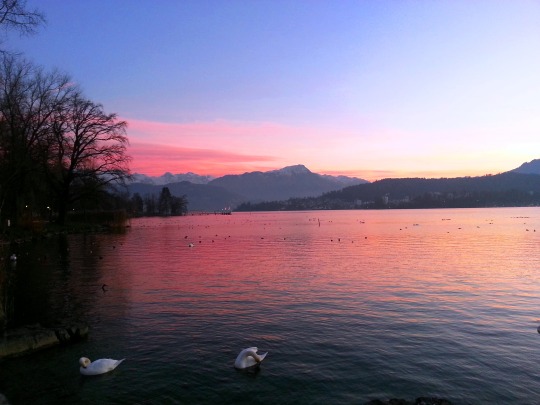













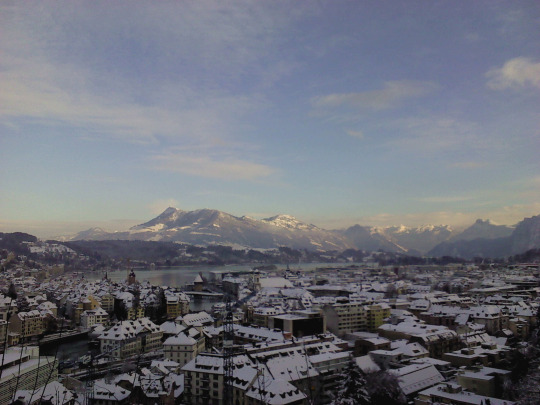

World Snow Day
So much joy can be had when the winter weather comes! As long as you're dressed appropriately with the right gear, the cold weather doesn’t need to get in the way.
Celebrating and participating in winter sports and outdoor fun is a delightful way to spend World Snow Day!
History of World Snow Day
The International Ski Federation (also known as FIS—from their official French title, Fédération internationale de ski et de snowboard) is the organization that founded World Snow Day. The FIS was begun back in 1910, when delegates from ten different countries got together in Norway. Now the world’s foremost governing body for Olympic events such as skiing and snowboarding, the International Ski Federation includes at least 180 groups of different national skiing organizations.
World Snow Day is celebrated on the third Sunday in January each year; the inaugural celebration started in 2012. World Snow Day, however, was the second phase of the FIS campaign to get more kids involved with snow sports. The first phase, which was called ‘Bring Children to the Snow’, began five years earlier.
The purpose of World Snow Day is to encourage families to make lasting memories with their children, as well as to offer opportunities for kids to have experiences with winter sports like snowboarding and skiing.
How to Celebrate World Snow Day
Get on board with skiing, snowboarding and a number of other different activities in celebration and enjoyment of World Snow Day. Start with some of these fun ideas:
Create a World Snow Day Event
World Snow Day offers the perfect opportunity to enjoy the day by gathering some friends and family members to participate in a winter sports event. Whether it’s sledding, skiing or snowboarding, it’s fun to get people together to celebrate the day on the slopes!
Those who host public World Snow Day events, such as ski slopes or snowboarding parks, can register their local events on the website to get more traction with various participants.
Make Snow Ice Cream
One fun treat to enjoy on National Snow Day is ice cream that is made from snow! Kids will love the idea of eating a treat made in this special way. Add eight cups of freshly gathered snow to one can of sweetened condensed milk and one teaspoon of vanilla extract. Mix together, add toppings and serve immediately.
Learn Fun Facts About Snow
Spend some time on World Snow Day to glean some information about the most important part of the day which is, of course, the snow. Raise awareness by sharing some fun bits of trivia with friends or coworkers. Try out some of these fun facts for World Snow Day:
Snow is a natural sound buffer. When it falls, a layer of fresh snow can act as a buffer to absorb the sound waves and create a much quieter ambience where sounds don’t bounce around.
Chionophobia is the fear of snow. People with this fear have an extreme reaction to snowy weather and can have a huge impact on everyday life. The name is chionophobia because the Greek word for snow is chióni.
Some monkeys love snow. Macaque monkeys, which are native to Japan, are known as snow monkeys and have been observed playing with snowballs that they have made.
Snowflakes can be pretty fast. While some snowflakes can fall at a fairly slow and leisurely rate, other times they may be moving at a speed that is somewhere around 9 miles per hour and, of course, the wind can help to speed up their movement.
Enjoy Snow Themed Crafts with Kids
School teachers and parents might want to consider making some different crafts and art projects that are themed around the idea of snow. Even if it’s too cold, or if there doesn’t happen to be snow on the ground, it can still be fun to celebrate. Get started with some of these World Snow Day craft ideas for kids:
Build an Indoor Snowman. Cut out circles in three different sizes from white paper. Stack them on top of each other and glue them together. Add accessories including a black top hat, a carrot nose, coal briquettes for buttons and perhaps a bright red scarf to top it all off!
Make Paper Snowflakes. This can be a fun way to get creative with something as simple as white paper and just a pair of scissors. Start by folding the paper into several different folds and then make cuts out of the edges or in the middle. Open it up to reveal a unique snowflake!
Write a Snow Poem. Those who are more artistic with words might want to write a little poem, short story or haiku about snow. Then do a read-aloud so that everyone can share their clever written Snow Day projects.
Make a Snow Globe. Use glass canning jars with lids to create a cute snow globe. Build a scene on the lid by gluing small figures such as trees or other items. Fill the jar with glycerine and glitter, then screw the lid on top to create a fun, homemade snow globe.
Take a Snowy Vacation
Have the most fun on World Snow Day by planning a skiing or snowboarding vacation. Some of the best possible places around the world to ski may include:
Zermatt, Switzerland. With some of the world’s beautiful mountains, Zermatt is the highest area for winter sports in all of the Alps. The Matterhorn is one of the most unbelievable peaks and the world’s highest lift is located there at over 3800 meters in altitude.
Courchevel, France. Get some of the best snow thrills that can be found in the world with this mountain that is not for the faint of heart! With ten summits higher than 2500 meters, it’s an amazing delight.
Whistler Blackcomb, Canada. This one offers some of the best skiing in North America with more than 200 different runs and 37 lifts.
World Snow Day FAQs
What can you do on World Snow Day?
World Snow Day can be filled with all sorts of fun, winter activities such as skiing, snowboarding and sledding.
What are the chances of a snow day?
The chances of a snow day very much depends on the particular location. People in the US can choose to use an online snow day calculator.
Does it snow in California?
Yes, some regions of California get snow, such as the western fronts of the mountain ranges.
Do snow days still exist?
Since the world got used to having options for online or remote school, bad weather days may no longer be needed in some school districts.
How much snow for a snow day?
In the southern portions of the US, almost any snow will bring about a snow day and canceled school. In the northern states, it may be around 2-3 inches.
Source
#British Columbia#Yukon#Rocky Mountains#Mount Robson#Mount Shasta#Cascade Range#sunrise#sunset#Gütschwald#Melchsee Frutt#forest#woods#cityscape#Lucerne#Luzern#Lake Lucerne#Vierwaldstättersee#Switzerland#Schweiz#Swiss Alps#Lake Överuman#Sweden#Stanserhorn#Mount Rigi#Mount Pilatus#original photography#tourist attraction#landmark#flora#fauna
2 notes
·
View notes
Photo

France Could Deploy Blockchain Ticketing for Paris 2024 Olympic Games
The interministerial delegate of the French Government’s Olympics – submitted a report to the Prime Minister of France containing some potential amendments for the 2024 Olympic Games.
使用区块链技术通过旋转二维码获取它们。一旦进入会场,每个人都会办理手续并停用门票,这种个性化将给个人带来许多好处,因为他们将能够通过数字渠道接收有关如何从巴黎每个地区到达场地以及奥运会期间的安全程序等问题的信息,区块链票务可以成功地融入在法国举行的其他重大体育赛事中。
#blockchain #區塊鏈 #metaverse
8 notes
·
View notes
Text
Women of color also sought political rights both in France and its colonies, though because their numbers were small, they never posed as great a threat as white French women. The most celebrated moment for a “mulatress” came in June 1793. Jeanne, Odo, une petite fille of mixed race reportedly 114 years old, joined a delegation to the National Convention of blacks of both sexes demonstrating for the abolition of slavery. The president gave her the fraternal kiss and seated her in an armchair at his side. That day Georges-Jacques Danton spoke of “universal liberty.” It should be noted, however, that the much celebrated Odo received a kiss, not a voice in the government.
French women taken collectively emerged from the Revolution with fewer rights and privileges than they had had under the Ancien Regime. Before the convening of the Estates General in 1789, a few privileged women, notable heads of religious orders, some noblewomen and widows, could vote. In the words of Olympe de Gouges: “Since the Revolution this sex [woman], once despicable but respected, has become respectable but despised.”
from Londa Schiebinger, “Theories of Race and Gender" (1993)
0 notes
Text
The Haudenosaunee National Lacrosse Teams Gain Support from Biden for 2028 Olympics (dated to 19 December 2023, shared on 20 December 2023):
At the White House Tribal Summit this month, President Joe Biden voiced his support for The Haudenosaunee National Lacrosse teams to compete in the upcoming 2028 Olympics under their own flag, in a show of support for tribal sovereignty.
In October, The International Olympic Committee voted to add lacrosse to the 2028 Olympic games in Los Angeles, California (LA28), for the first time in more than a century.
The Haudenosaunee—a confederacy of six nations between the United States and Canada, including Mohawk, Oneida, Onondaga, Cayuga and Seneca, and Tuscarora—invented lacrosse and remain competitive at it on a world stage.
The Haudenosaunee Nationals men’s team ranks third in the world behind the United States and Canada in outdoor (and second indoor), and took home the bronze medal at the men's World Lacrosse Championships in June. The women’s team is ranked eighth globally and won gold at the Pan-American Lacrosse Association tournament in Jamaica in November.
“Their ancestors invented the game,” Biden said to a room full of Tribal delegates and members of Congress in Washington D.C. on Dec. 7. “They perfected it for a millennia. Their circumstances are unique, and they should be granted an exception to field their own team at the Olympics.”
Rex Lyons (Onondaga) is a former player for the then-Iroquois Nationals (the team changed its name in 2022 because Iroquois is a derogatory term the French called the Haudenosaunee) and a sitting board member for the Haudenosaunee Nationals Lacrosse Organization. He was on the inaugural team in 1983. Lyons told Native News Online that the Haudenosaunee are the “best ambassadors” for the sport of lacrosse.
“It's not like we don't belong there,” Lyons said. “And not only that, it’s our game. We are the originators. It’s a medicine game.”
For men and women Haudenosaunee lacrosse players, the ability to compete at the Olympics under their own flag would mean representation, liberation, and honor.
“For me personally, it would be a true honor,” said 31-year-old Mohawk player, Randy Staats. “It’s all the best words you could possibly think of, rolled up into one, to be able to put on that jersey and go side by side with all the other countries in the world. It’s not only representing my family and my people, but other Native people. It gives them hope and change for treaties that they have with their government.”
Casandra “Bean” Minerd (Onondaga), a 28-year-old member of the Haudenosaunee National women’s team, told Native News Online that competing as a sovereign nation in the Olympics would create an opportunity for global education. As an Indigenous woman, she said she’s used to debunking myths and defending her existence.
“Us going to the Olympics would be an opportunity for education, where we’re not going to be fighting as much to prove who we are…and that we’re not extinct,” Minerd said. “I know that when that time comes, and we're walking out with our flag and wearing our gear with Haudenosaunee across our chest, I'll be sobbing the whole time because it’s just so huge. It’s bigger than myself. We’re giving the opportunity to kids thinking they can work towards becoming an Olympic athlete.”
1 note
·
View note
Text
Vibrant Closing Ceremony Marks the End of Memorable Hangzhou Asian Games 2023
India’s Remarkable Performance at Asian Games in Hangzhou
The 2023 Asian Games in Hangzhou came to an end with a memorable closing ceremony that praised the participants’ outstanding accomplishments and highlighted Chinese culture.
Indian competitors made a standout performance in the 19th Asian Games in Hangzhou, China, that was marked by quality and tenacity. India, who had a delegation of 655 athletes, accomplished an incredible accomplishment by breaking their previous record of 70 medals established in Jakarta in 2018 and winning a total of 107 medals.
28 gold, 38 silver, and 41 bronze medals made up India’s impressive medal haul, which was an increase above the 70 medals earned by a squad of 570 athletes four years earlier. Only four countries managed to surpass the 100-medal threshold in Hangzhou, making India’s contribution to the total medal count all the more noteworthy.
The Indian shooters stood out among the competitors, winning 22 medals in all, including seven golds. Neeraj Chopra successfully defended his javelin throw championship, giving athletics its opportunity to shine. Track and field competitions gave India a total of six gold, fourteen silver and nine bronze medals.
India’s success in archery was further enhanced when the compound team won all five gold medals available in their division. The gold rush was maintained by the cricket and kabaddi teams, who each took home two gold medals. Along with winning gold, the men’s hockey team also qualified for the Paris 2024 Olympics.
India Secures Olympic Quotas and Historic Gold Wins
Chirag Shetty and Satwiksairaj Rankireddy’s triumph in badminton signified India’s first men’s doubles gold medal at the Games. Squash, tennis, and equestrian victories added to India’s total gold medal count. The cricket teams for men and women both won gold.
The significance of Hangzhou, though, went beyond the number of medals. The competition offered 74 slots in several sports as a lead-up to the Paris 2024 Olympics. Six of these quotas were won by India, with boxing taking the top spot.
The tickets to Paris were acquired by athletes including Nikhat Zareen, Preeti Pawar, Parveen Hooda, and Lovlina Borgohain. India had a significant presence in the French city thanks to men’s hockey and athletics, assuring that the country would be well-represented at the next Olympic Games.
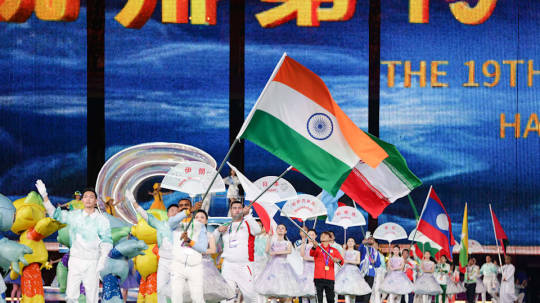
A Vibrant Closing Ceremony
The 80,000-person-seat ‘Big Lotus’ Stadium served as the venue for the event, which attracted viewers with a 75-minute show of lights, music, and lasers. The conclusion of more than two weeks of gruelling sports action was marked by the athletes from the 45 participating nations bidding farewell.
The goal of the closing ceremony’s “Culture and Sports” merger of sports and culture was to achieve harmony. In front of Chinese Premier Li Qiang and other officials, acting head of the Olympic Council of Asia (OCA), Randhir Singh, formally proclaimed the 19th Asian Games to be over.
Also Read: India vs Australia World Cup 2023: Virat Kohli and KL Rahul Lead IND to a Six-Wicket Victory
In accordance with the principles of the Olympic Council of Asia, Singh declared the 19th Hangzhou Asian Games ended and invited the youth of Asia to come together to celebrate the 20th Asian Games in Aichi-Nagoya, Japan, in three years.
Follow Digital Fox Media for latest sports news.
0 notes
Text
Paris 2024: Olympic Opening Ceremony Director Says Event Must Be Militant
This ceremony must carry a sense of militancy, as we must ensure that the Olympic Games maintain their distinct identity from the Olympic Games, noted Jolly, according to a report by L'Équipe. As we celebrate Olympic athletes, I believe it's essential to address the themes of equal rights and a fundamental issue like mobility. Additionally, numerous other battles need to be fought.
"The ceremony holds significant architectural and symbolic importance due to its location in Paris, and it also carries a potent political message," he added.

The Opening Ceremony of the Paris 2024 Olympic Games is set to be centered around the Place de la Concorde, which stands as the largest square in the French capital. The Parade of Nations, featuring approximately 4,400 athletes from 184 delegations around the world, is scheduled to commence at the Champs-Élysées. The procession will cover the distance from the top of the Avenue des Champs-Élysées at the Arc de Triomphe down to the Place de la Concorde, spanning a 1.6-mile journey lasting about 30 minutes.
Paris 2024: Weaving Equality and Olympism Ceremonies for a New Era
The seating for around 65,000 attendees will be temporarily installed in the square to accommodate the ceremony. Jolly's objective is to artistically convey the struggle for equal rights for individuals with disabilities through a variety of mediums.
That's my vision, he stated. I aimed to draw inspiration from the principles of Olympism, the historical significance of these locations, and the broader context. Together with the team of writers and artists, we've crafted a narrative for this ceremony. Currently, we're in the development phase, collaborating with other artistic experts across various domains, including music, dance, art, and fashion.
Andrew Parsons, the President of the International Olympic Committee, has been presented with the initial event plans and reportedly expressed his satisfaction with what he saw. The same creative team is working on both the Opening and Closing Ceremonies for both the Olympics and Olympics, with Jolly leading as the artistic director for all four events.
While Jolly is focused on highlighting key distinctions between the Olympics and the Olympics, he also aims to weave an artistic thread with the same vigor and signature throughout the ceremonies. Similarly, the Olympic Opening Ceremony is anticipated to unfold beyond the confines of a traditional stadium setting. The Parade of Nations will feature delegations journeying down the Seine River on boats, with onlookers lining the riverbanks.
Olympic Paris: Olympic Opening Ceremony A Tapestry of Inclusion and Advocacy
The unique vision for the Paris 2024 Olympic Opening Ceremony extends beyond the traditional boundaries of celebratory events. As Thomas Jolly and his dedicated team press on with their creative endeavor, they are breathing life into an unprecedented experience that speaks to the heart of inclusivity, diversity, and the power of human determination.
Eticketing.co offers Olympic Paris Tickets for Paris 2024 at the best prices. Olympic games fans can buy Olympic Opening Ceremony Tickets & Olympic Closing Ceremony Tickets at exclusively discounted prices.
Jolly's emphasis on a militant tone underscores the fact that the Paris Olympic Games are not a mere extension of the Olympic 2024 Games but a distinct platform to champion equal rights and challenge societal perceptions. The ceremony's architectural grandeur in the iconic city of Paris aligns with its powerful political and social message, creating a potent blend of art and advocacy.
The choice of the Place de la Concorde as the ceremonial focal point exemplifies the symbolic significance of this event. This historic square, which has witnessed pivotal moments in French history, now becomes a stage for a new chapter: a proclamation of unity and a celebration of the strength of the human spirit.
The Parade of Nations down the Champs-Élysées mirrors the pathway to progress, where athletes from diverse backgrounds and cultures come together in a dazzling display of shared humanity. This journey of 1.6 miles is more than a physical route; it's a metaphor for the distance we've traveled in recognizing and respecting the rights of those with disabilities.
Paris 2024: Olympic Opening Ceremony's Message of Equality
The temporary seating arrangements in the square serve as a testament to the commitment to accessibility. As 65,000 spectators gather, they'll witness not just a performance but a call to action. Jolly's artistic vision aims to bridge the gap between aesthetics and advocacy, using music, dance, art, and fashion to deliver a profound and universal message of equality.
The collaboration with experts from various artistic disciplines highlights the holistic approach taken in crafting this ceremony. The story woven into the event draws from the legacy of Olympism while addressing the contemporary challenges faced by people with disabilities. By aligning with this rich narrative, the ceremony transforms into a vessel of inspiration and a platform for change.
As Andrew Parsons, the President of the International Olympic Committee, expresses his satisfaction with the initial plans, a sense of anticipation builds. The shared creative team for both the Olympic and Olympic Ceremonies underscores the desire to maintain artistic cohesion while celebrating the distinctiveness of each event.
In Olympic Paris 2024, the world will witness not just athletic prowess but a profound artistic spectacle that transcends the norm. The Olympic Opening Ceremony becomes a clarion call for equal rights, an ode to human potential, and a vivid portrayal of the intricate threads that bind us all. On that day, the Seine's tranquil waters will bear witness to a procession that echoes the journey of society itself one that embraces diversity, rejects limitations, and propels us toward a brighter, more inclusive future.
Olympic 2024: Olympic Opening Ceremony's Tribute to Diversity and Purpose
Amidst the anticipation and meticulous preparations, Thomas Jolly's guiding principle remains steadfast: to capture the essence of the Olympic spirit and communicate it through every facet of the ceremony. The term militant isn't meant to incite conflict, but rather to awaken a sense of purpose to stand up for the rights and dignity of individuals with disabilities. Jolly's dedication to crafting an experience distinct from the Olympic Games demonstrates a commitment to honoring the unique stories and challenges that Olympic athletes bring to the global stage.
Eticketing.co offers Olympic 2024 Tickets for the France Olympics at the best prices. Olympic fans can buy Olympic Paris Tickets at exclusively discounted prices.
As the world's gaze converges on the Place de la Concorde, the significance of the location reverberates. This square has witnessed both tumultuous history and triumphant moments, making it an apt backdrop for an event that transcends sport. It symbolizes the progress made in recognizing the importance of inclusion and accessibility while acknowledging that there is still ground to cover.
The Parade of Nations down the iconic Champs-Élysées tells a story of unity in diversity. Athletes, each representing a nation and a personal journey, march together as a testament to human resilience. The path they tread echoes the path of progress one that involves challenges, triumphs, and the unyielding spirit to move forward.
The temporary seating that transforms the square into a stage of unity is a metaphor. It's a tangible representation of how society can adapt, accommodate, and celebrate the abilities of everyone. As spectators fill these seats, they become part of a larger narrative, one that transcends nationalities and embraces a shared aspiration for equality.
Paris Olympic 2024: Olympic Opening Ceremony's Message of Unity and Transformation
Jolly's collaboration with experts across various artistic disciplines showcases the power of creativity as a tool for change. Music, dance, art, and fashion are more than mere embellishments; they are vehicles to convey emotions, provoke thoughts, and inspire action. These artistic expressions have the potential to break down barriers, spark conversations, and amplify the call for equal rights.
As the Opening Ceremony comes into focus, Andrew Parsons' satisfaction with the plans reflects the culmination of countless hours of dedication. The fact that the same creative team is responsible for both the Olympic and Olympic Ceremonies underscores the idea that these events are two sides of the same coin celebrations of human endeavor and the pursuit of excellence, regardless of one's abilities.
In a world where divisions often dominate headlines, the Paris 2024 Olympic Games Opening Ceremony stands as a beacon of hope. It's a reminder that when we channel our energy into embracing diversity and breaking down barriers, remarkable things can happen. The Seine's gentle flow, carrying the Parade of Nations on boats, becomes a metaphor for the fluidity of progress, as we navigate towards a more inclusive and compassionate society.
In the heart of Paris, where history and modernity intersect, an artistic spectacle is taking shape. More than a performance, more than a ceremony, this is a profound statement of the potential of humanity. The Paris 2024 Games Opening Ceremony is poised to etch its mark not just on the annals of sports history, but on the collective consciousness of a world yearning for change.
We offer Olympic Games Tickets to admirers who can get France Olympic tickets through our trusted online ticketing marketplace. Eticketing.co is the most reliable source for booking Paris Olympic 2024 Tickets. Sign up for the latest Paris 2024 Ticket alert.
1 note
·
View note
Text
Worlds: A day without a medal
Sarah-Léonie Cysique and Joan-Benjamin Gaba, the two Frenchmen of the day, failed to win a medal at the World Judo Championships in Doha on Tuesday.
With two medals in two days for the French women’s delegation at the world judo championships in Doha, the series ended on Tuesday. Sarah-Léonie Cysique finished seventh in the -57kg category. The 2021 Olympic vice-champion and 2022 European…

View On WordPress
0 notes
Text
Blockchain Tickets For The Olympics
According to a recent coverage, Michel Cadot – the interministerial delegate of the French Government’s Olympics – submitted a report to the Prime Minister of France containing some potential amendments for the 2024 Olympic Games.
One recommendation focuses on the ticketing system that will support the event. In his view, permits based on blockchain technology will provide fans with additional security. According to his plan, tickets should be non-transferable and sent by the organization a few days before the start of the Olympics.
Spectators will be able to acquire them via a rotating QR code using blockchain technology. Once entering the venue, everyone will check-in and deactivate their ticket.
Cadot believes this personalization will grant individuals numerous benefits as they will be able to receive messages via digital channels on issues such as how to reach the venue from every district in Paris and safety procedures during the Games. He also argued that blockchain ticketing could be successfully integrated into other major sports events held in France:
“These provisions are already planned for the 2023 Rugby World Cup and the Olympics and Paralympics 2024 and practiced by major events such as the French International Tennis.”
https://cryptopotato.com/france-could-deploy-blockchain-ticketing-for-paris-2024-olympic-games-report/?amp
0 notes
Text
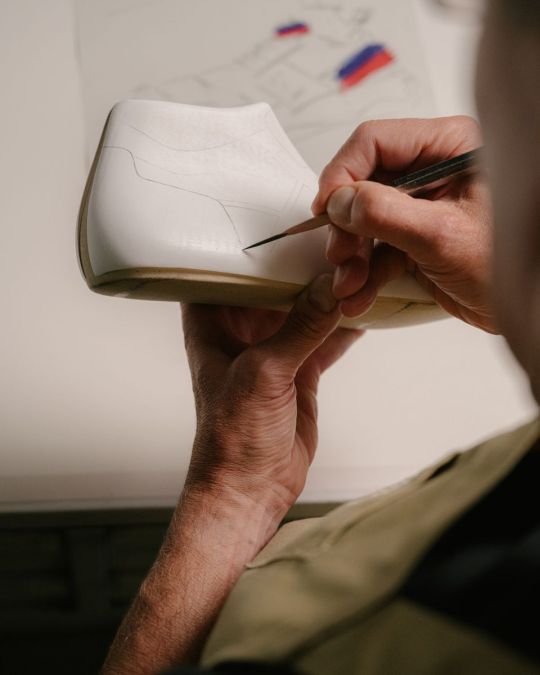
Berluti | French Olympic Delegation | Maxime Verret
16 notes
·
View notes
Photo


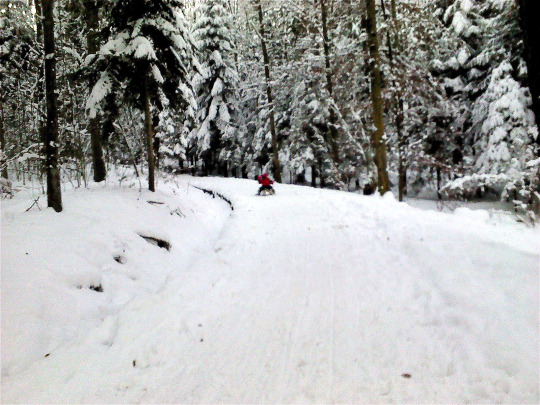







World Snow Day
So much joy can be had when the winter weather comes! As long as you're dressed appropriately with the right gear, the cold weather doesn’t need to get in the way.
Celebrating and participating in winter sports and outdoor fun is a delightful way to spend World Snow Day!
History of World Snow Day
The International Ski Federation (also known as FIS—from their official French title, Fédération internationale de ski et de snowboard) is the organization that founded World Snow Day. The FIS was begun back in 1910, when delegates from ten different countries got together in Norway. Now the world’s foremost governing body for Olympic events such as skiing and snowboarding, the International Ski Federation includes at least 180 groups of different national skiing organizations.
World Snow Day is celebrated on the third Sunday in January each year; the inaugural celebration started in 2012. World Snow Day, however, was the second phase of the FIS campaign to get more kids involved with snow sports. The first phase, which was called ‘Bring Children to the Snow’, began five years earlier.
The purpose of World Snow Day is to encourage families to make lasting memories with their children, as well as to offer opportunities for kids to have experiences with winter sports like snowboarding and skiing.
How to Celebrate World Snow Day
Get on board with skiing, snowboarding and a number of other different activities in celebration and enjoyment of World Snow Day. Start with some of these fun ideas:
Create a World Snow Day Event
World Snow Day offers the perfect opportunity to enjoy the day by gathering some friends and family members to participate in a winter sports event. Whether it’s sledding, skiing or snowboarding, it’s fun to get people together to celebrate the day on the slopes!
Those who host public World Snow Day events, such as ski slopes or snowboarding parks, can register their local events on the website to get more traction with various participants.
Make Snow Ice Cream
One fun treat to enjoy on National Snow Day is ice cream that is made from snow! Kids will love the idea of eating a treat made in this special way. Add eight cups of freshly gathered snow to one can of sweetened condensed milk and one teaspoon of vanilla extract. Mix together, add toppings and serve immediately.
Learn Fun Facts About Snow
Spend some time on World Snow Day to glean some information about the most important part of the day which is, of course, the snow. Raise awareness by sharing some fun bits of trivia with friends or coworkers. Try out some of these fun facts for World Snow Day:
Snow is a natural sound buffer. When it falls, a layer of fresh snow can act as a buffer to absorb the sound waves and create a much quieter ambience where sounds don’t bounce around.
Chionophobia is the fear of snow. People with this fear have an extreme reaction to snowy weather and can have a huge impact on everyday life. The name is chionophobia because the Greek word for snow is chióni.
Some monkeys love snow. Macaque monkeys, which are native to Japan, are known as snow monkeys and have been observed playing with snowballs that they have made.
Snowflakes can be pretty fast. While some snowflakes can fall at a fairly slow and leisurely rate, other times they may be moving at a speed that is somewhere around 9 miles per hour and, of course, the wind can help to speed up their movement.
Enjoy Snow Themed Crafts with Kids
School teachers and parents might want to consider making some different crafts and art projects that are themed around the idea of snow. Even if it’s too cold, or if there doesn’t happen to be snow on the ground, it can still be fun to celebrate. Get started with some of these World Snow Day craft ideas for kids:
Build an Indoor Snowman. Cut out circles in three different sizes from white paper. Stack them on top of each other and glue them together. Add accessories including a black top hat, a carrot nose, coal briquettes for buttons and perhaps a bright red scarf to top it all off!
Make Paper Snowflakes. This can be a fun way to get creative with something as simple as white paper and just a pair of scissors. Start by folding the paper into several different folds and then make cuts out of the edges or in the middle. Open it up to reveal a unique snowflake!
Write a Snow Poem. Those who are more artistic with words might want to write a little poem, short story or haiku about snow. Then do a read-aloud so that everyone can share their clever written Snow Day projects.
Make a Snow Globe. Use glass canning jars with lids to create a cute snow globe. Build a scene on the lid by gluing small figures such as trees or other items. Fill the jar with glycerine and glitter, then screw the lid on top to create a fun, homemade snow globe.
Take a Snowy Vacation
Have the most fun on World Snow Day by planning a skiing or snowboarding vacation. Some of the best possible places around the world to ski may include:
Zermatt, Switzerland. With some of the world’s beautiful mountains, Zermatt is the highest area for winter sports in all of the Alps. The Matterhorn is one of the most unbelievable peaks and the world’s highest lift is located there at over 3800 meters in altitude.
Courchevel, France. Get some of the best snow thrills that can be found in the world with this mountain that is not for the faint of heart! With ten summits higher than 2500 meters, it’s an amazing delight.
Whistler Blackcomb, Canada. This one offers some of the best skiing in North America with more than 200 different runs and 37 lifts.
World Snow Day FAQs
What can you do on World Snow Day?
World Snow Day can be filled with all sorts of fun, winter activities such as skiing, snowboarding and sledding.
What are the chances of a snow day?
The chances of a snow day very much depends on the particular location. People in the US can choose to use an online snow day calculator.
Does it snow in California?
Yes, some regions of California get snow, such as the western fronts of the mountain ranges.
Do snow days still exist?
Since the world got used to having options for online or remote school, bad weather days may no longer be needed in some school districts.
How much snow for a snow day?
In the southern portions of the US, almost any snow will bring about a snow day and canceled school. In the northern states, it may be around 2-3 inches.
Source
#sunrise#sunset#Güthschwald#Melchsee Frutt#forest#woods#cityscape#Lucerne#Luzern#Lake Lucerne#Vierwaldstättersee#Switzerland#Schweiz#Swiss Alps#Lake Överuman#Sweden#Stanserhorn#Mount Rigi#Mount Pilatus#original photography#tourist attraction#landmark#flora#fauna#swan#sled#World Snow Day#Titlis#WorldSnowDay#15 January 2023
1 note
·
View note
Text
France Could Deploy Blockchain Ticketing for Paris 2024 Olympic Games (Report)
France Could Deploy Blockchain Ticketing for Paris 2024 Olympic Games (Report)
The French government’s Olympic committee is ready to stage the Paris 2024 Olympics with minimal security risks for fans. Thus, the organization could integrate blockchain technology into its ticketing system and provide personalized non-transferable passes to spectators.
Blockchain to the rescue
According to recent coverage, Michel Cadot – the French government’s inter-ministerial delegate for…

View On WordPress
0 notes
Text
A Tribute to the Olympic Games
🕊

A Tribute and Summary of the History of the Olympic Games
BY: Greek Cooking Made Easy
SUBSCRIBE TO MY YOUTUBE CHANNEL: https://www.youtube.com/greekcookingmadeeasy
Greece is the country that gave birth to the ancient Olympic Games over 2,700 years ago, and the country where the modern Olympic Games were revived in 1896.
The Ancient Years
The roots of the Olympic Spirit can be found in the ancient Greek civilization. The ancient Olympic Games seem to date back to 776 BC, because no names of winners were known before that date. The ancient plains of Olympia in the Peloponnese, famous as the location of magnificent temples dedicated to the worship of God Zeus and Goddess Hera, served as the Games’ permanent site. The games were held every four years.
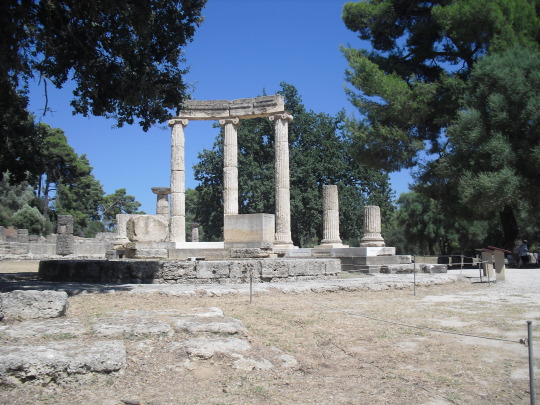
The competitions were strongly religious events, combining spiritual aspects with the trials of sport. Their significance was great, since they seemed to be the most important athletic event for the whole of Greece (city-states).
The Greeks even measured their years by reference to the Olympics! Thousands of people came from all over Greece to compete or watch. If there was a war, there was a truce around the time of the Olympics to allow all competitors to go. The Olympic Truce or “ekeheiria” meaning the ceasing of hostilities during the duration of the games was inextricably linked with the concept of the Olympic Spirit.
Most spectators slept in the open or in tents. There was no city at ancient Olympia, just the sanctuary, and sporting venues.

The Games initially included a one-day event until 684 BC, when they were expanded to three days and later on (5th century BC) to five days.
In addition to athletic events, there were also religious ceremonies and banquets. Only male citizens were allowed to compete. All slaves, all women and men who had committed certain crimes were excluded. Women weren't even allowed to watch, apart from a priestess of Demeter and possibly also girls. For some of the events, there were also competitions for boys. There were far fewer sports than in the modern Olympics.
The main events were: the foot races, wrestling, the pentathlon, boxing, chariot racing, equestrian sports, juggling, but also music, oratory and theatre performances.

Participation was more important than victory itself. The prizes for winning competitions at the Olympics were very simple. The ultimate award was a wreath of “kotinos”, made of olive tree branches and fame!

Each polis (city-state) was eager to have one of its citizens win and so would offer all kinds of additional prizes to any of its citizens who won. These might include front row seats at festivals or even free meals for life. A winner also had the right to erect a statue of himself at Olympia. Poets might also be commissioned to write a poem about the winner. There were no second or third prizes.
When Greece was incorporated into the Roman Empire (27 BC), the Games were open to Roman officials, emperors even, and eventually to all citizens of the vast dominion: Egyptians, Spaniards, Syrians, Armenians and others, which means that the Olympic Games were no longer merely panhellenic- they had become universal. For nearly 12 centuries the Games were staged every four years (with over 290 Games being held), until in 393 AD, the Roman Emperor Theodosius prohibited their continuation, believing them to be a pagan ritual.
Olympia was ruined by earthquakes, fires, floods and suffered the ravages of barbarian invaders. Olympia didn’t exist anymore.
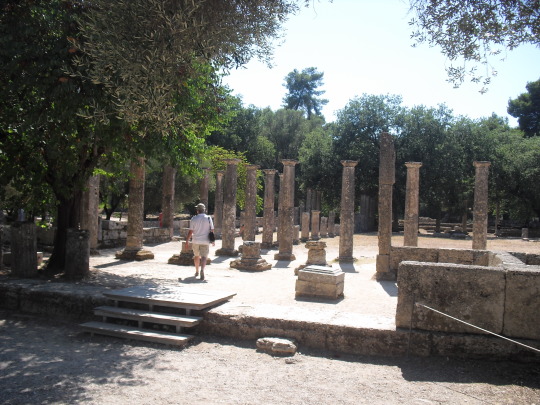
The revival of the Olympic Games
Olympia was buried under river-silt and it was 1,000 years before Olympia’s buildings were seen again. Archaeologists began the search for Olympia in the 18th century, but the most important excavations were carried out between 1875 and 1891, by the German Archaeological Institute. Directed by Professor Ernst Curtius, a team unearthed the remains of almost all the buildings.

They found 130 statues and more than 6,000 clay, gold, and bronze objects!

Professor Curtius made the initial suggestion to revive the ancient Olympic Games – an idea brought to fruition in the early 1890’s by the French Baron Pierre de Coubertin.
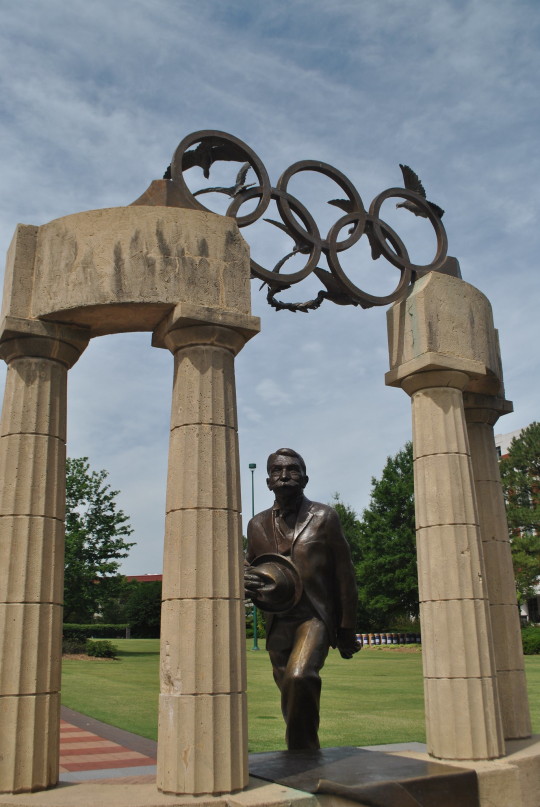
A Parisian nobleman and an admirer of ancient Greek civilization, de Coubertin believed that a revival of the ancient Olympic Games could serve as an important role model for sporting values and a venue for the young people of the world to meet in peaceful athletic competition. Under his enthusiasm and guidance, the movement of Olympic revival was born.
A Congress for the reestablishment of the Olympic Games was held in Sorbonne in June 1894. Seventy-nine delegates from around the world convened for 8 days and a unanimous vote was taken to revive the Olympic Games. On the same year, de Coubertin founded the International Olympic Committee (IOC), a non-profit organization charged with the responsibility of supervising and organizing the Olympic Games. Dimitris Vikelas, the Greek delegate, was elected the first IOC President.
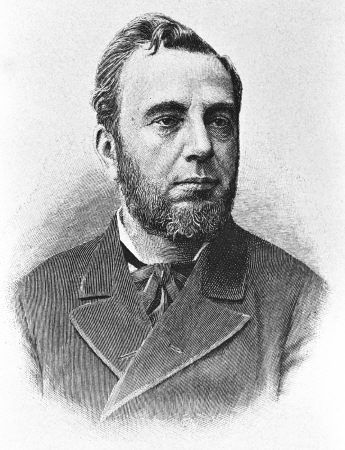
Although de Coubertin’s original idea was to hold the first games in 1900 in Paris, Vikelas succeeded in persuading the IOC to move the day forward, so that the first modern games, would take place in Greece, the country to whose heritage the ancient Olympic Games belonged.

The 1st Modern Olympic Games of 1896
The first modern Olympics were organized in 1896 and were awarded to Athens, Greece as an honor to the country where the ancient Olympics were born. An estimated crowd of 100,000 gathered to watch the first games. The first Olympics featured over 43 events in ten sports.

The revival of the ancient Olympics attracted 241 athletes (0 women) from 14 nations, with the largest delegations coming from Greece, Germany and France. On 6 April 1896, the American James Connolly won the triple jump to become the first Olympic champion in more than 1,500 years.
Winners were awarded a silver medal and a crown of olive branches. The German athlete Karl Schumann finished in the top four in four different events. The people of Athens greeted the Games with great enthusiasm. Their support was rewarded when a Greek shepherd, Spiridon Louis, won the most popular event, the Marathon.
Athens hosted again the Olympic Games in 2004.
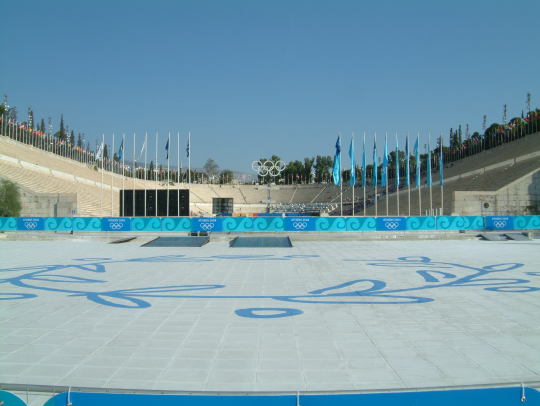

International Olympic Committee (IOC) Diplomats
In order to make the IOC an independent organization, the members of the IOC are not considered diplomats from their countries to the IOC, but rather are diplomats from the IOC to their respective countries.
Interesting Olympic Facts
A City, Not a Country: When choosing locations for the Olympic Games, the IOC specifically gives the honor of holding the Games to a city rather than a country.
Gymnasium
The word "gymnasium" comes from the Greek root "gymnos" meaning nude; the literal meaning of "gymnasium" is "school for naked exercise." Athletes in the ancient Olympic Games would participate in the nude.
Stadium
The first recorded ancient Olympic Games were held in 776 BCE with only one event - the stade.
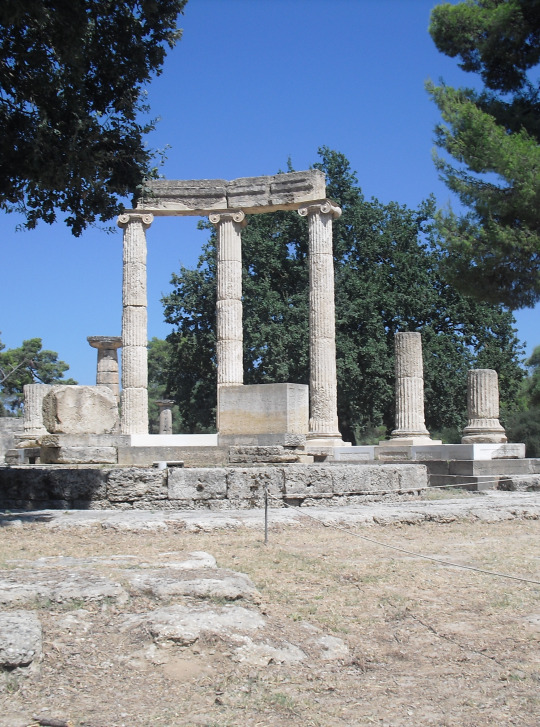
The stade was a unit of measurement (about 600 feet) that also became the name of the footrace because it was the distance run. Since the track for the stade (race) was a stade (length), the location of the race became the stadium.

Photos from my family’s visit in ancient Olympia

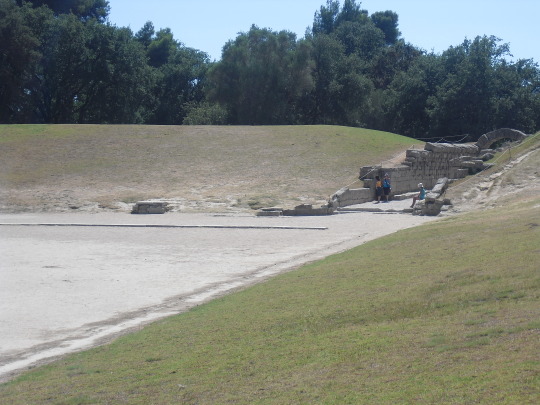
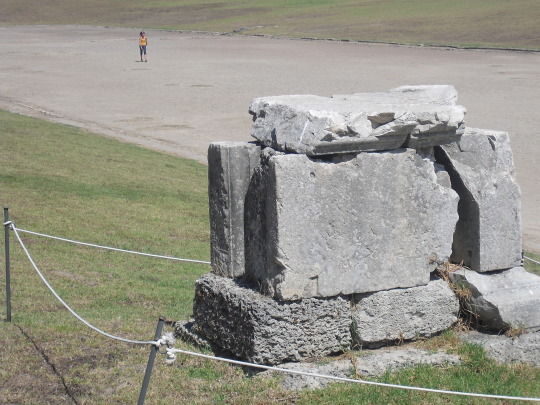
Counting Olympiads
An Olympiad is a period of four successive years. The Olympic Games celebrate each Olympiad. For the modern Olympic Games, the first Olympiad celebration was in 1896. Every four years celebrates another Olympiad; thus, even the Games that were cancelled (1916, 1940, and 1944) count as Olympiads.
The Official Olympic Flag
Created by Pierre de Coubertin in 1914, the Olympic flag contains five interconnected rings on a white background. The five rings symbolize the five significant continents and are interconnected to symbolize the friendship to be gained from these international competitions. The rings, from left to right, are blue, yellow, black, green, and red. The colors were chosen because at least one of them appeared on the flag of every country in the world. The Olympic flag was first flown during the 1920 Olympic Games.
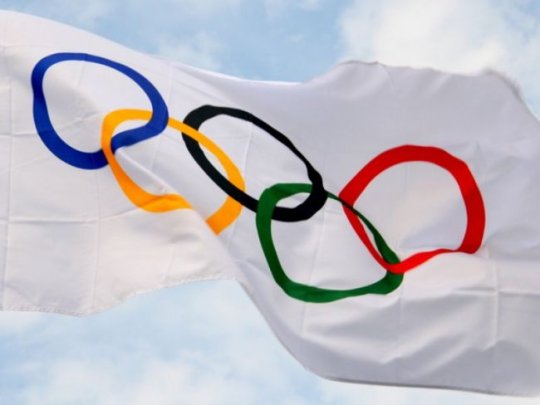
The Olympic Motto
In 1921, Pierre de Coubertin, founder of the modern Olympic Games, borrowed a Latin phrase from his friend, Father Henri Didon, for the Olympic motto: Citius, Altius, Fortius ("Swifter, Higher, Stronger").
The Olympic Oath
Pierre de Coubertin wrote an oath for the athletes to recite at each Olympic Games. During the opening ceremonies, one athlete recites the oath on behalf of all the athletes. The Olympic oath was first taken during the 1920 Olympic Games by Belgian fencer Victor Boin.
The Olympic Oath states:
"In the name of all competitors, I promise that we shall take part in these Olympic Games, respecting and abiding by the rules that govern them, in the true spirit of sportsmanship, for the glory of sport and the honor of our teams."
The Olympic Creed
Pierre de Coubertin got the idea for this phrase from a speech given by Bishop Ethelbert Talbot at a service for Olympic champions during the 1908 Olympic Games.
The Olympic Creed reads:
"The most important thing in the Olympic Games is not to win but to take part, just as the most important thing in life is not the triumph but the struggle. The essential thing is not to have conquered but to have fought well."
The Medals
The Olympic medals are designed especially for each individual Olympic Games by the host city's organizing committee. Each medal must be at least three millimeters thick and 60 millimeters in diameter. Also, the gold and silver Olympic medals must be made out of 92.5 percent silver, with the gold medal covered in six grams of gold.

Real Gold Medals
The last Olympic gold medals that were made entirely out of gold were awarded in 1912.
The Olympic Flame
The Olympic flame is a practice continued from the ancient Olympic Games. In Olympia (Greece), a flame was ignited by the sun and then kept burning until the closing of the Olympic Games. The flame first appeared in the modern Olympics at the 1928 Olympic Games, in Amsterdam. The flame itself represents a number of things, including purity and the endeavor for perfection.
In 1936, the chairman of the organizing committee for the 1936 Olympic Games, Carl Diem, suggested what is now the modern Olympic Torch relay. The Olympic flame is lit at the ancient site of Olympia by women wearing ancient-style robes and using a curved mirror and the sun.
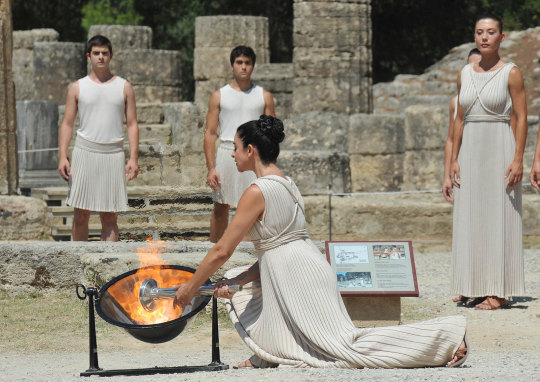
The Olympic Torch is then passed from runner to runner from the ancient site of Olympia to the Olympic stadium in the hosting city. The flame is then kept alight until the Games have concluded. The Olympic Torch relay represents a continuation from the ancient Olympic Games to the modern Olympics.
Opening Ceremony
The first opening ceremony was held during the 1908 Olympic Games in London.
During the opening ceremony of all the Olympic Games, the procession of athletes is always led by the Greek delegation (team), followed by all the other teams in alphabetical order (in the language of the hosting country), except for the last team which is always the team of the hosting country.
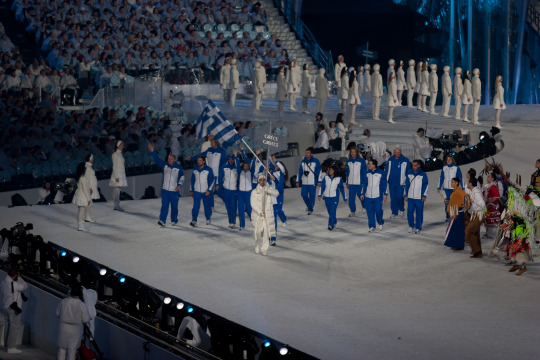
Women participating
Women were first allowed to participate in 1900, at the second modern Olympic Games.
The First Marathon
In 490 BCE, Pheidippides, a Greek soldier, ran from Marathon to Athens (about 25 miles) to inform the Athenians the outcome of the battle with invading Persians. The distance was filled with hills and other obstacles; thus Pheidippides arrived in Athens exhausted and with bleeding feet. After telling the townspeople of the Greeks' success in the battle, Pheidippides fell to the ground dead. In 1896, at the first modern Olympic Games, a race was held of approximately the same length in commemoration of Pheidippides.
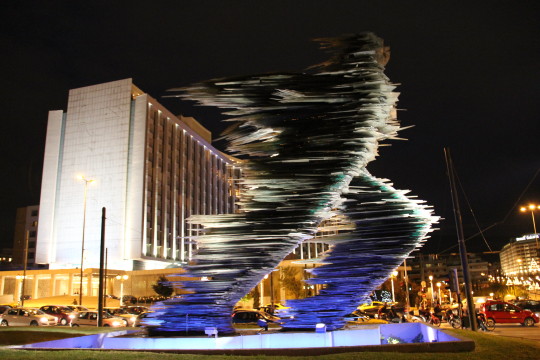
The Exact Length of a Marathon
During the first several modern Olympics, the marathon was always an approximate distance. In 1908, the British royal family requested that the marathon starts at the Windsor Castle so that the royal children could witness its start. The distance from the Windsor Castle to the Olympic Stadium was 42,195 meters (or 26 miles and 385 yards). In 1924, this distance became the standardized length of a marathon.
Cancelled Games
Because of World War I and World War II, there were no Olympic Games in 1916, 1940, or 1944. In 2020, Olympic Games that were supposed to be hosted in Tokyo were postponed due to the Covid-19 pandemic. They will be held in the Summer of 2021, but without live spectators for the 1st time in its history!!

Winter Games Begun
The winter Olympic Games were first held in Chamonix in 1924, beginning a tradition of holding them a few months earlier and in a different city than the summer Olympic Games.
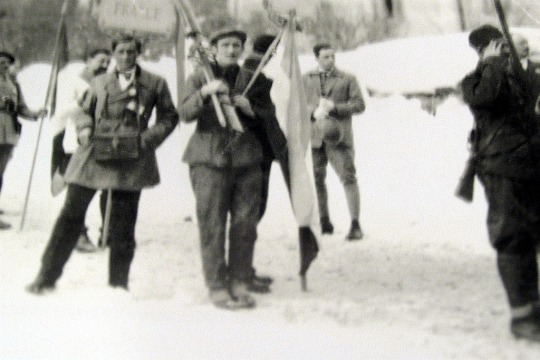
From 1994, the winter Olympic Games were held in completely different years (two years apart) than the summer Games.
The History of Olympic truce
A truce (in Greek, ekecheiria, which literally means "holding of hands") was announced before and during each of the Olympic festivals, to allow visitors to travel safely to Olympia. Shortly prior to the start of the Olympics, three "spondophoroi" wearing crowns of olive branches, would leave Elis to announce the truce. Initially this was for one month but later on, (from the 5th century B.C.), three months, (calculated from the day of departure of the "spondophoroi"). During the sacred truce, athletes and spectators could travel unmolested to Olympia.
An inscription describing the truce was written on a bronze discus which was displayed at Olympia. During the truce, wars were suspended, armies were prohibited from entering Elis (present-day Ileia), or threatening the Games, and legal disputes and the carrying out of death penalties were forbidden. Any violation of the ceasefire was considered irreverence to Zeus himself, to whom the event was dedicated. Apart from a few exceptions, the truce was observed as being sacred in view of the fact that for the Greeks the athletic festivals were of great significance. Mention is made of King Philip the Second of Macedonia, father of Alexander the Great, who sought pardon and paid the penalty when one of his mercenaries impeded the Athenian Phrynon from travelling to Olympia to attend the festival.
International Olympic Truce Foundation
The mission of the International Olympic Truce Foundation is to promote the Olympic ideals, to serve peace, friendship and international understanding. In particular, to uphold the observance of the Olympic Truce, calling for all hostilities to cease during the Olympic Games and beyond, and mobilizing the youth of the world in the cause of peace. The International Olympic Truce Centre is dedicated to creating the necessary support framework for the observance of the Olympic Truce and for the global promotion of a Culture of Peace, in accordance with the principles and policies established by the Foundation.

The legacy of being an Olympic Athlete
In ancient times, like today, to be an Olympic athlete was a supreme honour. Ancient Olympic champions were looked after by their fellow townsfolk for the rest of their lives, although they also enjoyed the redoubtable honour of fighting in the front line. Today, nearly 100,000 athletes who have competed in the Olympic Games, better known as Olympians, spread the values of Olympism around the world. Their performance and courage symbolize the Olympic spirit. Each Olympian bears a message of sharing, respect and resolve.
The Olympic Hymn
The Olympic Hymn, played when the Olympic Flag is raised, was composed by Spyros Samaras and the words were added by the poet Kostis Palamas. The Olympic Hymn was first played at the 1896 Olympic Games in Athens but wasn't declared the official hymn by the IOC until 1957.

The Olympic Hymn translated in English:
“Olympian flame immortal
Whose beacon lights our way
Emblaze our hearts with the fires of hope
On this momentous day
As now we come across the world
To share these Games of old
Let all the flags of every land
In brotherhood unfold
Sing out each nation, voices strong
Rise up in harmony
All hail our brave Olympians
With strains of victory
Olympic light burn on and on
O'er seas and mountains and plains
Unite, inspire, bring honor
To these ascending games”
Thank you for reading through my tribute. All information was researched and gathered from many different resources incl. Wikipedia.
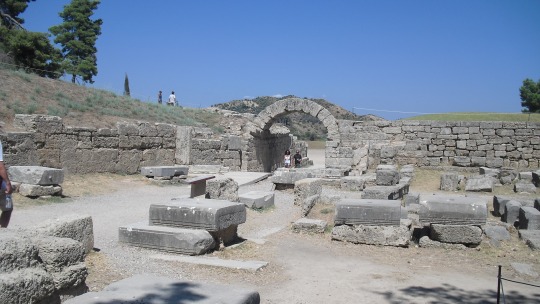
Αφιέρωμα και περιληπτική Ιστορία των Ολυμπιακών Αγώνων
BY: Greek Cooking Made Easy
SUBSCRIBE TO MY YOUTUBE CHANNEL: https://www.youtube.com/greekcookingmadeeasy
Η Ελλάδα είναι η χώρα που γέννησε τους αρχαίους Ολυμπιακούς Αγώνες πριν από 2.700 χρόνια και η χώρα όπου οι σύγχρονοι Ολυμπιακοί Αγώνες αναβίωσαν το 1896.
Τα αρχαία χρόνια
Οι ρίζες του Ολυμπιακού Πνεύματος βρίσκονται στον αρχαίο Ελληνικό πολιτισμό. Οι αρχαίοι Ολυμπιακοί Αγώνες φαίνεται να χρονολογούνται από το 776 π.Χ., επειδή δεν υπήρχαν γνωστά ονόματα νικητών πριν από αυτήν την ημερομηνία. Οι πεδιάδες της Ολυμπίας στην Πελοπόννησο, γνωστές ως η τοποθεσία των υπέροχων ναών αφιερωμένων στη λατρεία του Θεού Δία και της Θεάς Ήρας, χρησίμευαν ως μόνιμος χώρος των Αγώνων.

Οι αγώνες διεξήγονταν κάθε τέσσερα χρόνια. Οι αγώνες είχαν έντονο θρησκευτικό χαρακτήρα, συνδυάζοντας πνευματικές πτυχές μαζί με τις αθλητικές προσπάθειες. Η σημασία τους ήταν μεγάλη, καθώς φαινόταν να είναι το πιο σημαντικό αθλητικό γεγονός για ολόκληρη την Ελλάδα (πόλεις-κράτη).
Οι Έλληνες μετρούσαν ακόμη και τα χρόνια τους με αναφορά στους Ολυμπιακούς Αγώνες! Χιλιάδες άνθρωποι μαζευόντουσαν από όλη την Ελλάδα για να αγωνιστούν ή να παρακολουθήσουν. Εάν υπήρχε πόλεμος, γινόταν ανακωχή γύρω από την εποχή των Ολυμπιακών Αγώνων που θα επέτρεπε σε όλους τους διαγωνιζόμενους να πάνε. Η «Ολυμπιακή Εκεχειρία» που σημαίνει διακοπή των εχθροπραξιών κατά τη διάρκεια των αγώνων συνδέθηκε άρρηκτα με την έννοια του Ολυμπιακού Πνεύματος.
Οι περισσότεροι θεατές κοιμόντουσαν στο ύπαιθρο ή σε σκηνές. Δεν υπήρχε πόλη στην αρχαία Ολυμπία, μόνο το ιερό και οι αθλητικοί χώροι.

Οι Αγώνες αρχικά ήταν γεγονός μιας μέρας, έως το 684 π.Χ., όταν επεκτάθηκαν σε τρεις ημέρες και αργότερα (5ος αιώνας π.Χ.) σε πέντε ημέρες.
Εκτός από αθλητικές εκδηλώσεις, υπήρχαν επίσης θρησκευτικές τελετές και δεξιώσεις. Μόνο άντρες πολίτες είχαν τη δυνατότητα να διαγωνιστούν. Αποκλείονταν όλοι οι σκλάβοι, όλες οι γυναίκες και οι άνδρες που είχαν διαπράξει ορισμένα εγκλήματα. Δεν επιτρεπόταν καν στις γυναίκες να παρακολουθήσουν, εκτός από μια ιέρεια της θεάς Δήμητρας και πιθανώς κορίτσια. Για μερικές από τις εκδηλώσεις, υπήρχαν επίσης διαγωνισμοί για ανήλικα αγόρια. Υπήρχαν πολύ λιγότερα αθλήματα από ό, τι στους σύγχρονους Ολυμπιακούς Αγώνες.

Οι κύριες εκδηλώσεις ήταν: το τρέξιμο, η πάλη, το πένταθλο, η πυγμαχία, οι αγώνες με άρμα, τα ιππικά αθλήματα, η ταχυδακτυλουργία, αλλά και η μουσική, η ρητορική και οι θεατρικές παραστάσεις.
Η συμμετοχή ήταν πιο σημαντική από την ίδια τη νίκη. Τα βραβεία για τη νίκη στους Ολυμπιακούς αγώνες ήταν πολύ απλά. Το απόλυτο βραβείο ήταν ένα στεφάνι από «κότινο», φτιαγμένο δηλ. από κλαδιά ελιάς και η φήμη!

Κάθε πόλη-κράτος ήθελε πολύ να κερδίσει ένας από τους πολίτες της και έτσι προσέφερε κάθε είδους πρόσθετα έπαθλα σε οποιονδήποτε από τους πολίτες της κέρδιζε. Αυτά μπορεί να περιλάμβαναν καθίσματα πρώτης σειράς σε φεστιβάλ ή ακόμη και δωρεάν γεύματα για όλη τους τη ζωή. Ένας νικητής είχε επίσης το δικαίωμα να ανεγείρει το άγαλμα του στην Ολυμπία. Μπορούσε ακόμα και να ανατεθεί στους ποιητές να γράψουν ένα ποίημα για τον νικητή. Δεν υπήρχε δεύτερο ή τρίτο βραβείο.
Όταν η Ελλάδα ενσωματώθηκε στη Ρωμαϊκή Αυτοκρατορία (27 π.Χ.), οι Αγώνες ήταν ανοιχτοί σε Ρωμαίους αξιωματούχους, ακόμα και αυτοκράτορες, αλλά επίσης και σε πολίτες της τεράστιας αυτοκρατορίας: Αιγύπτιοι, Ισπανοί, Σύριοι, Αρμένιοι και άλλοι, πράγμα που σημαίνει ότι οι Ολυμπιακοί Αγώνες δεν ήταν πλέον απλώς πανελλήνιοι - είχαν γίνει διεθνείς.
Για σχεδόν 12 αιώνες οι Αγώνες διοργανώνονταν κάθε τέσσερα χρόνια (με τη διεξαγωγή περισσότερων από 290 Αγώνες), μέχρι το 393 μ.Χ., όταν ο Ρωμαίος αυτοκράτορας Θεοδόσιος απαγόρευσε τη συνέχισή τους, θεωρώντας τους ειδωλολατρική τελετή.
Η Ολυμπία καταστράφηκε από σεισμούς, πυρκαγιές, πλημμύρες και υπέστη καταστροφές από βάρβαρους εισβολείς. Η Ολυμπία δεν υπήρχε πια.

Η αναβίωση των Ολυμπιακών Αγώνων
Η Ολυμπία θάφτηκε κάτω από τη λάσπη του ποταμού και πέρασαν 1.000 χρόνια πριν τα κτήρια της ξαναδούν το φως. Οι αρχαιολόγοι ξεκίνησαν την αναζήτηση για την Ολυμπία τον 18ο αιώνα, αλλά οι σημαντικότερες ανασκαφές πραγματοποιήθηκαν μεταξύ 1875 και 1891, από το Γερμανικό Αρχαιολογικό Ινστιτούτο. Κάτω από την εποπτεία του καθηγητή Ernst Curtius, μια ομάδα ξεκίνησε την ανασκαφή των υπολειμμάτων σχεδόν όλων των κτιρίων.

Βρέθηκαν τότε 130 αγάλματα και περισσότερα από 6.000 πήλινα, χρυσά και χάλκινα αντικείμενα!

Ο καθηγητής Curtius έκανε την αρχική πρόταση για αναβίωση των αρχαίων Ολυμπιακών Αγώνων - μια ιδέα που πραγματοποιήθηκε στις αρχές της δεκαετίας του 1890 από τον Γάλλο βαρόνο Pierre de Coubertin.

Παρισινός ευγενής και θαυμαστής του αρχαίου Ελληνικού πολιτισμού, ο de Coubertin πίστευε ότι η αναβίωση των αρχαίων Ολυμπιακών Αγώνων θα μπορούσε να χρησιμεύσει ως σημαντικό πρότυπο για τις αθλητικές αξίες και ως χώρος για τους νέους του κόσμου να συναντηθούν σε έναν ειρηνικό αθλητικό διαγωνισμό. Υπό τον ενθουσιασμό και την καθοδήγησή του, γεννήθηκε το κίνημα της Ολυμπιακής αναβίωσης.
Συνέδριο για την αποκατάσταση των Ολυμπιακών Αγώνων πραγματοποιήθηκε στη Σορβόννη τον Ιούνιο του 1894. Συγκλήθηκαν εβδομήντα εννέα εκπρόσωποι από όλο τον κόσμο για 8 ημέρες και έγινε ομόφωνη ψηφοφορία για την αναβίωση των Ολυμπιακών Αγώνων. Την ίδια χρονιά, ο de Coubertin ίδρυσε τη Διεθνή Ολυμπιακή Επιτροπή (ΔΟΕ), μια μη κερδοσκοπική οργάνωση επιφορτισμένη με την εποπτεία και τη διοργάνωση των Ολυμπιακών Αγώνων. Ο Δημήτρης Βικέλας, Έλληνας εκπρόσωπος, εξελέγη ο 1ος Πρόεδρος της ΔΟΕ.

Παρόλο που η αρχική ιδέα του de Coubertin ήταν να πραγματοποιήσει τους πρώτους αγώνες το 1900 στο Παρίσι, ο Βικέλας κατάφερε να πείσει την ΔΟΕ να γίνουν νωρίτερα, έτσι ώστε οι πρώτοι σύγχρονοι αγώνες να διεξαχθούν στην Ελλάδα, τη χώρα στην οποία ανήκε η κληρονομιά των αρχαίων Ολυμπιακών Αγώνων.

Οι 1οι Σύγχρονοι Ολυμπιακοί Αγώνες του 1896
Οι πρώτοι σύγχρονοι Ολυμπιακοί Αγώνες διοργανώθηκαν το 1896 και απονεμήθηκαν στην Αθήνα, ως τιμή για τη χώρα όπου γεννήθηκαν οι αρχαίοι Ολυμπιακοί Αγώνες. Εκτιμάται ότι συγκεντρώθηκαν περίπου 100.000 άνθρωποι για να τους παρακολουθήσουν. Οι πρώτοι Ολυμπιακοί Αγώνες παρουσίασαν πάνω από 43 εκδηλώσεις σε δέκα αθλήματα.

Η αναβίωση των αρχαίων Ολυμπιακών Αγώνων προσέλκυσε 241 αθλητές (0 γυναίκες) από 14 χώρες, με τις μεγαλύτερες αντιπροσωπείες να προέρχονται από την Ελλάδα, τη Γερμανία και τη Γαλλία. Στις 6 Απριλίου 1896, ο Αμερικανός Τζέιμς Κόνολι κέρδισε το τριπλό άλμα και έγινε ο πρώτος Ολυμπιονίκης μετά από 1.500 χρόνια.
Στους νικητές απονεμήθηκε ένα ασημένιο μετάλλιο και ένα στεφάνι από κλαδιά ελιάς. Ο Γερμανός αθλητής Karl Schumann τερμάτισε στους ��έσσερις πρώτους σε τέσσερα διαφορε��ικά αθλήματα. Οι άνθρωποι της Αθήνας χαιρέτησαν τους Αγώνες με μεγάλο ενθουσιασμό. Η υποστήριξή τους ανταμείφθηκε όταν ένας Έλληνας βοσκός, ο Σπύρος Λούης, κέρδισε το πιο δημοφιλές αθλητικό γεγονός, τον Μαραθώνιο.
Η Αθήνα φιλοξένησε ξανά τους Ολυμπιακούς Αγώνες το 2004.


Διπλωμάτες της Διεθνούς Ολυμπιακής Επιτροπής (ΔΟΕ)
Για να καταστεί η ΔΟΕ ανεξάρτητη οργάνωση, τα μέλη της ΔΟΕ δεν θεωρούνται διπλωμάτες από τις χώρες τους στην ΔΟΕ, αλλά αντίστροφα διπλωμάτες από την ΔΟΕ στις αντίστοιχες χώρες τους.
Ενδιαφέροντα Ολυμπιακά Γεγονότα
Πόλη, όχι Χώρα: Κατά την επιλογή τοποθεσίας για τους Ολυμπιακούς Αγώνες, η ΔΟΕ δίνει συγκεκριμένα την τιμή να διοργανώσει τους Αγώνες μια πόλη και όχι μια χώρα.
Γυμνάσιο
Η λέξη "Γυμνάσιο" προέρχεται από την ελληνική ρίζα "γυμνός". Η κυριολεκτική έννοια του «γυμνασίου» είναι «σχολείο άσκησης γυμνών». Οι αθλητές στους αρχαίους Ολυμπιακούς Αγ��νες συμμετείχαν γυμνοί.
Στάδιο
Οι πρώτοι αρχαίοι Ολυμπιακοί Αγώνες πραγματοποιήθηκαν το 776 π.Χ. με ένα μόνο γεγονός - το τρέξιμο.

Το στάδιο ήταν μια μονάδα μέτρησης (περίπου 600 πόδια). Δεδομένου ότι η πίστα για τον αγώνα τρεξίματος μεγάλης απόστασης είχε συγκεκριμένο μήκος, η τοποθεσία του αγώνα ονομάστηκε «στάδιο».

Φωτογραφίες από την επίσκεψη της οικογενείας μου στην Αρχαία Ολυμπία!



Καταμέτρηση Ολυμπιάδων
Μια Ολυμπιάδα είναι μια περίοδος τεσσάρων διαδοχικών ετών. Οι Ολυμπιακοί Αγώνες γιορτάζουν κάθε Ολυμπιάδα. Για τους σύγχρονους Ολυμπιακούς Αγώνες, η πρώτη γιορτή της Ολυμπιάδας ήταν το 1896. Κάθε τέσσερα χρόνια γιορτάζει μια νέα Ολυμπιάδα. Έτσι, ακόμη και οι Αγώνες που ακυρώθηκαν (1916, 1940 και 1944), υπολογίζονται ως Ολυμπιάδες.
Η Επίσημη Ολυμπιακή Σημαία
Δημιουργία του Pierre de Coubertin το 1914, η Ολυμπιακή σημαία περιέχει πέντε διασυνδεδεμένους δακτυλίους σε λευκό φόντο. Οι πέντε δακτύλιοι (κύκλοι) συμβολίζουν τις πέντε σημαντικές ηπείρους και συνδέονται μεταξύ τους για να συμβολίσουν τη φιλία που θα αποκτηθεί από τους αγώνες. Οι δακτύλιοι, από αριστερά προς τα δεξιά, είναι μπλε, κίτρινο, μαύρο, πράσινο και κόκκινο. Τα χρώματα επιλέχθηκαν επειδή τουλάχιστον ένα από αυτά εμφανίζεται στη σημαία κάθε χώρας στον κόσμο. Η Ολυμπιακή σημαία κυμάνθηκε για πρώτη φορά στους Ολυμπιακούς Αγώνες του 1920.

Το Ολυμπιακό σύνθημα
Το 1921, ο Pierre de Coubertin, ιδρυτής των σύγχρονων Ολυμπιακών Αγώνων, δανείστηκε μια λατινική φράση από τον φίλο του, Πατέρα Henri Didon, για το Ολυμπιακό σύνθημα: Citius, Altius, Fortius ("Πιο Γρήγορα, Πιο Ψηλά, Πιο Δυνατά").
Ο Ολυμπιακός Όρκος
Ο Πιέρ ντε Κουμπέρτιν έγραψε έναν όρκο για τους αθλητές ώστε να τον απαγγέλλουν σε κάθε Ολυμπιακούς Αγώνες. Κατά την τελετή έναρξης, ένας αθλητής απαγγέλλει τον όρκο εκ μέρους όλων των αθλητών. Ο Ολυμπιακός όρκος ακούστηκε για πρώτη φορά κατά τη διάρκεια των Ολυμπιακών Αγώνων του 1920 από τον Βέλγο αθλητή ξιφασκίας Victor Boin.
Ο Ολυμπιακός Όρκος δηλώνει
«Στο όνομα όλων των αγωνιζομένων, υπόσχομαι ότι θα λάβουμε μέρος σε αυτούς τους Ολυμπιακούς Αγώνες, σεβόμενοι και τηρώντας τους κανόνες που τους διέπουν, με το πραγματικό πνεύμα της αθλητικότητας, για τη δόξα του αθλητισμού και την τιμή των ομάδων μας».
Το Ολυμπιακό Πιστεύω
Ο Pierre de Coubertin πήρε την ιδέα για αυτή τη φράση από μια ομιλία που έδωσε ο Επίσκοπος Ethelbert Talbot σε δεξίωση για Ολυμπιονίκες κατά τη διάρκεια των Ολυμπιακών Αγώνων του 1908.
Το Ολυμπιακό Πιστεύω λέει:
"Το πιο σημαντικό πράγμα στους Ολυμπιακούς Αγώνες δεν είναι να κερδίσεις αλλά να συμμετέχεις, όπως και το πιο σημαντικό πράγμα στη ζωή δεν είναι ο θρίαμβος αλλά ο αγώνας. Το βασικό είναι να μην έχεις κατακτήσει αλλά να έχεις αγωνιστεί καλά."
Τα Μετάλλια
Τα Ολυμπιακά μετάλλια σχεδιάζονται ειδικά για κάθε συγκεκριμένους Ολυμπιακούς Αγώνες από την οργανωτική επιτροπή της πόλης υποδοχής. Κάθε μετάλλιο πρέπει να έχει πάχος τουλάχιστον τρία χιλιοστά και διάμετρο 60 χιλιοστά. Επίσης, τα χρυσά και ασημένια ολυμπιακά μετάλλια πρέπει να είναι από 92,5 % ασήμι, με το χρυσό μετάλλιο να καλύπτεται από έξι γραμμάρια χρυσού.

Αληθινά Χρυσά μετάλλια
Τα τελευταία ολυμπιακά χρυσά μετάλλια που έγιναν εξ ολοκλήρου από χρυσό απονεμήθηκαν το 1912.
Η Ολυμπιακή Φλόγα
Η Ολυμπιακή φλόγα είναι μια πρακτική που συνεχίστηκε από τους αρχαίους Ολυμπιακούς Αγώνες. Στην Ολυμπία, μια φλόγα άναβε από τον ήλιο και στη συνέχεια συνέχιζε να καίει μέχρι το κλείσιμο των Ολυμπιακών Αγώνων.
Η φλόγα εμφανίστηκε για πρώτη φορά στους σύγχρονους Ολυμπιακούς Αγώνες του 1928, στο Άμστερνταμ.
Η φλόγα αντιπροσωπεύει πολλά πράγματα, συμπεριλαμβανομένης της αγνότητας και της προσπάθειας για τελειότητα.
Το 1936, ο πρόεδρος της οργανωτικής επιτροπής για τους Ολυμπιακούς Αγώνες του 1936, Carl Diem, πρότεινε αυτό που είναι τώρα η σύγχρονη σκυταλοδρομία της Ολυμπιακής φλόγας. Η Ολυμπιακή φλόγα ανάβει στον αρχαίο χώρο της Ολυμπίας από γυναίκες που φορούν ρόμπες αρχαϊκές, χρησιμοποιώντας έναν κυρτό καθρέφτη και τον ήλιο.

Η Ολυμπιακή φλόγα μεταφέρεται στη συνέχεια από δρομέα σε δρομέα από τον αρχαίο χώρο της Ολυμπίας στο Ολυμπιακό στάδιο της πόλης που τους φιλοξενεί. Στη συνέχεια, η φλόγα διατηρείται αναμμένη μέχρι να ολοκληρωθούν οι αγώνες. Η σκυταλοδρομία αντιπροσωπεύει τη συνέχεια από τους αρχαίους Ολυμπιακούς Αγώνες στους σύγχρονους.
Η Τελετή έναρξης
Η πρώτη τελετή έναρξης πραγματοποιήθηκε κατά τη διάρκεια των Ολυμπιακών Αγώνων του 1908 στο Λονδίνο.
Κατά τη διάρκεια της τελετής έναρξης όλων των Ολυμπιακών Αγώνων, η πομπή αθλητών ξεκινάει πάντα από την Ελληνική Αποστολή (ομάδα), ακολουθούμενη από όλες τις άλλες ομάδες με αλφαβητική σειρά (στη γλώσσα της χώρας υποδοχής), εκτός από την τελευταία ομάδα που είναι πάντα η ομάδα της χώρας υποδοχής των Αγώνων.

Γυναίκες
Οι γυναίκες είχαν το δικαίωμα να συμμετάσχουν για 1η φορά το 1900, στους 2ους σύγχρονους Ολυμπιακούς Αγώνες.
Ο Πρώτος Μαραθώνιος
Το 490 π.Χ., ο Φειδιππίδης, Έλληνας στρατιώτης, έτρεξε από τον Μαραθώνα στην Αθήνα (περίπου 25 μίλια) για να ενημερώσει τους Αθηναίους για το αποτέλεσμα της μάχης με τους Πέρσες. Η απόσταση ήταν γεμάτη με λόφους και άλλα εμπόδια. Έτσι ο Φειδιππίδης έφτασε στην Αθήνα εξαντλημένος και με πόδια ματωμένα. Αφού είπε στους κατοίκους της πόλης την επιτυχία των Ελλήνων στη μάχη, ο Φειδιππίδης έπεσε στο έδαφος νεκρός. Το 1896, στους πρώτους σύγχρονους Ολυμπιακούς Αγώνες, πραγματοποιήθηκε ένας αγώνας περίπου του ίδιου μήκους προς τιμήν της μνήμης του Φειδιππίδη.

Το ακριβές μήκος ενός μαραθωνίου
Κατά τη διάρκεια αρκετών σύγχρονων Ολυμπιακών Αγώνων, ο μαραθώνιος ήταν πάντα μια κατά προσέγγιση απόσταση. Το 1908, η βρετανική βασιλική οικογένεια ζήτησε να ξεκινήσει ο μαραθώνιος στο Κάστρο του Γουίντσορ, έτσι ώστε τα παιδιά της βασιλικής οικογένειας να μπορούν να δουν την έναρξη του. Η απόσταση από το Κάστρο του Windsor έως το Ολυμπιακό Στάδιο ήταν 42.195 μέτρα (ή 26 μίλια περίπου). Το 1924, αυτή η απόσταση έγινε το τυποποιημένο μήκος ενός μαραθωνίου.
Ακύρωση Αγώνων
Λόγω του Α' και του Β' Παγκοσμίου Πολέμου, δεν πραγματοποιήθηκαν Ολυμπιακοί Αγώνες το 1916, το 1940 και το 1944. Το 2020, οι Ολυμπιακοί Αγώνες που έπρεπε να φιλοξενηθούν στο Τόκιο αναβλήθηκαν λόγω της πανδημίας Covid-19. Θα πραγματοποιηθούν το καλοκαίρι του 2021, αλλά χωρίς θεατές για πρώτη φορά στην ιστορία του!

Οι χειμερινοί Ολυμπιακοί Αγώνες
Ξεκίνησαν για πρώτη φορά στο Σαμονί το 1924, ξεκινώντας μια παράδοση να γίνονται λίγους μήνες νωρίτερα και σε διαφορετική πόλη από τους θερινούς Ολυμπιακούς Αγώνες.

Από το 1994, οι χειμερινοί Ολυμπιακοί Αγώνες διεξάγονται σε εντελώς διαφορετική χρονιά (σε απόσταση δύο ετών), από τους θερινούς Αγώνες.
Η ιστορία της Ολυμπιακής εκεχειρίας
Εκεχειρία (στα Ελληνικά κυριολεκτικά σημαίνει «κράτημα των χεριών») ανακοινωνόταν πριν και κατά τη διάρκεια κάθε ολυμπιακού φεστιβάλ, για να επιτρέψει στους επισκέπτες να ταξιδέψουν με ασφάλεια στην Ολυμπία. Λίγο πριν από την έναρξη των Ολυμπιακών Αγώνων, τρεις "Σπονδοφόροι" που φορούσαν στεφάνια από κλαδιά ελιάς, έφευγαν από την Ηλεία για να ανακοινώσουν την εκεχειρία. Αρχικά αυτό ήταν για ένα μήνα, αλλά αργότερα, (από τον 5ο αιώνα π.Χ.), τρεις μήνες (υπολογισμένο από την ημέρα αναχώρησης των "σπονδοφόρων"). Κατά τη διάρκεια της ιερής εκεχειρίας, αθλητές και θεατές μπορούσαν να ταξιδέψουν με ασφάλεια στην Ολυμπία.
Μια επιγραφή που περιγράφει την εκεχειρία γραμμένη σε χάλκινο δίσκο βρέθηκε στην Ολυμπία. Κατά τη διάρκεια της ανακωχής, οι πόλεμοι σταματούσαν, απαγορευόταν οι στρατοί να εισέλθουν στην Ηλεία, ή να απειλήσουν τους Αγώνες, και απαγορεύονταν οι νομικές διαφορές και η εκτέλεση θανατικών ποινών. Οποιαδήποτε παραβίαση της κατάπαυσης του πυρός θεωρείτο ασέβεια για τον ίδιο τον Δία, στον οποίο ήταν αφιερωμένο το γεγονός. Εκτός από μερικές εξαιρέσεις, η εκεχειρία θεωρήθηκε ιερή επειδή για τους Έλληνες τα αθλητικά φεστιβάλ είχαν μεγάλη σημασία. Αναφέρεται ότι ο βασιλιάς Φίλιππος ο 2ος της Μακεδονίας, πατέρας του Μεγάλου Αλεξάνδρου, ζήτησε χάρη και πλήρωσε την ποινή, όταν ένας από τους μισθοφόρους του εμπόδισε τον Αθηναίο Φρύνωνα να ταξιδέψει στην Ολυμπία για να παρακολουθήσει το φεστιβάλ.
Διεθνές Ίδρυμα Ολυμπιακής Εκεχειρίας
Η αποστολή του International Olympic Truce Foundation (δηλ. Διεθνές Ίδρυμα Ολυμπιακής Εκεχειρίας) είναι η προώθηση των Ολυμπιακών ιδανικών, η εξυπηρέτηση της ειρήνης, της φιλίας και της διεθνούς κατανόησης. Συγκεκριμένα, για να υποστηρίξει την τήρηση της Ολυμπιακής Εκεχειρίας, ζητά να σταματήσουν όλες οι εχθροπραξίες κατά τη διάρκεια των Ολυμπιακών Αγώνων και πέραν αυτής, και να κινητοποιηθεί η νεολαία του κόσμου προς το σκοπό της ειρήνης. Το Διεθνές Ίδρυμα Ολυμπιακής Εκεχειρίας είναι αφιερωμένο στη δημιουργία του απαραίτητου πλαισίου στήριξης για την τήρηση της Ολυμπιακής Εκεχειρίας και για την παγκόσμια προώθηση ενός Πολιτισμού Ειρήνης, σύμφωνα με τις αρχές και τις πολιτικές που έχει θεσπίσει το Ίδρυμα.

Το κληροδότημα του Ολυμπιακού Αθλητή
Στην αρχαιότητα, όπως και σήμερα, το να είσαι ολυμπιακός αθλητής ήταν υπέρτατη τιμή. Οι αρχαίοι Ολυμπιακοί πρωταθλητές φροντίζονταν από τους συμπολίτες τους για το υπόλοιπο της ζωής τους, αν και απολάμβαναν επίσης την αναμφισβήτητη τιμή της μάχης που έδωσαν στην πρώτη γραμμή.
Σήμερα, σχεδόν 100.000 αθλητές που έχουν αγωνιστεί στους Ολυμπιακούς Αγώνες, διαδίδουν τις αξίες του Ολυμπισμού σε όλο τον κόσμο. Η επίδοση και το θάρρος τους συμβολίζουν το ολυμπιακό πνεύμα. Κάθε ένας τους κουβαλάει το μήνυμα της μοιρασιάς και συμμετοχής, του σεβασμού και της αποφασιστικότητας.
Ο Ολυμπιακός Ύμνος
Ο Ολυμπιακός Ύμνος, που παίζεται όταν υψώνεται η Ολυμπιακή Σημαία, συντέθηκε από τον Σπύρο Σαμαρά και οι στίχοι προστέθηκαν από τον Κωστή Παλαμά. Ο Ολυμπιακός Ύμνος παίχτηκε για πρώτη φορά στους Ολυμπιακούς Αγώνες του 1896 στην Αθήνα, αλλά δεν ανακηρύχθηκε επίσημος ύμνος από τη ΔΟΕ μέχρι το 1957.

Οι στίχοι του Ολυμπιακού Ύμνου:
«Αρχαίο Πνεύμα αθάνατον, αγνέ πατέρα
του ωραίου, του μεγάλου και τ' αληθινού,
κατέβα, φανερώσου κι άστραψε εδώ πέρα
στη δόξα της δικής σου γης και τ' ουρανού.
Στο δρόμο και στο πάλεμα και στο λιθάρι,
στων ευγενών Αγώνων λάμψε την ορμή,
και με το αμάραντο στεφάνωσε κλωνάρι
και σιδερένιο πλάσε και άξιο το κορμί.
Κάμποι, βουνά και θάλασσες φέγγουν μαζί σου
σαν ένας λευκοπόρφυρος μέγας ναός.
Και τρέχει στο ναό εδώ προσκυνητής σου,
Αρχαίο Πνεύμ' αθάνατο, κάθε λαός, κάθε λαός (2x)
Αρχαίο Πνεύμ' αθάνατο, κάθε λαός (2x)».
Transliterated into Latin alphabet:
«Arkhéo Pnévma athánato, aghné patéra
tou oréou, tou meghálou ke tou alithinoú
Katéva, fanerósou ki ástrapse edhó péra
sti dhóksa tis dhikís sou ghis ke t'ouranoú.
Sto dhrómo ke sto pálema ke sto lithári
Ston evghenón aghónon lámpse tin ormí.
Ke me to amáranto stefánose klonári
ke sidherénio pláse ke áksio to kormí. (2x)
Kámpi, vouná ke thálasses féngoune mazí sou
san énas lefkopórfyros méghas naós
Ke trékhi sto naó edhó proskynitís sou (2x)
Arkhéo Pnévma athánato, káthe laós. (2x)»
Σας ευχαριστώ που διαβάσατε το αφιέρωμα μου. Το έγραψα κατόπιν μελέτης και έρευνας από πολλά κείμενα συμπεριλ. και της Βικιπαίδεια.

#olympics#ancient olympics#olympic tribute#olympic history#greece#region#peloponnese#olympic games#olympia#ολυμπία#ολυμπιακοί αγώνες#αρχαίοι ολυμπιακοί αγώνες#ολυμπισμός
391 notes
·
View notes
Text
First day of the games, first medal for the French biathlon team - and for the French delegation. Way to go!
Congratulations to the athletes, it wasn't an easy race but they didn't give up for a second!
I'm glad they could finish on the podium for this first race - not only is the mixed relay my favourite biathlon event, but it's also a relief given the pressure there is knowing that biathlon is the sport that awarded France the most medals during the Winter Olympic Games for the last few decades. Now that the biathletes have won that first medal, they won't feel as pressured to earn a new one (though I know they are aiming to - those athletes have high ambition, and I'm sure they're aiming for individual titles as well!).
Unfortunately I'll be in class Monday during the women's individual (hopefully I'll make it through the day without encountering spoilers and be able to watch the race when I get home). But I'm free on Tuesday morning, so I'll be sure to watch the men's race!
All the best to the French athletes, be sure to have a lot of fun! No regrets!
3 notes
·
View notes
Text
The Didier Gailhaguet scandal - what the hell is happening with the french fed?
Okay, so here is a translation/summary of an article from the french newspaper Le Monde. (one of the major french newspapers). I think my summary is the closest possible to the original. I was planning on doing a full translation, but did not quite managed to do that in a way that would be understandable. Anyway here’s the link to the article (in french), if you want to check it out.
Sexual violence in figure skating : head of French federation, Didier Gailhaguet asked to resign.
The minister of sports, Roxana Maracineanu has asked Gailhaguet to resign. He asks for a period of reflexion.
Monday, Februray the 3rd, the minister asked to Gailhaguet’s resignation, and has launched the process which she describes as “the atomic weapon”: withdrawing FFSG’s delegation.
The federation stands accused of having employed until 2018 Gilles Beyer, a coach suspend by the ministry in 2001 after allegations of sexual assault. Last week three former skaters have come forward in the French press, saying they were abused by high profile coaches, in the seventies and nineties.
The minister of sports has spoken against the rule of silence inside the federation. (I’m broadly translating here. Here’s the full quote in French)
“manquements quasi institutionnalisés au sein de cette fédération. Le silence semble y être la règle pour de nombreux acteurs, élus ou techniciens ».
The french fed has 15 days to answer. The ministry will then consult the French national Olympic Committee (CNOSF). Per the journalist, it is extremely likely that the fed will lose its delegation. Which means it will be unable to administrate high level sport in all the disciplines covered : i.e. organising competition, and sending sportsmen to competitions abroad.
Therefore, the ministry will set a special procedure, supervised by the French Olympic Committee in order to register French figure skaters for Worlds.
The minister has also announced a new inquiry. She also wants to refer the case to the prosecutor, in order to open a criminal investigation. She has also pledged to create an organisation which would provide supports to the victims.
Quoting the minister here:
the number of events, and the span of time over which they occurred, point to general dysfunction inside the federation [...] Didier Gailhaguet cannot abdicate his moral and personal responsibility; I have therefore asked him to resign
Gailhaguet rejects all responsibility. He doesn’t rule out resignation, but he wants to consult the council of the federation, and wants to act “with lucidity and responsibility”. Le Monde points out that the council is entirely loyal to him.
It’s the first time Gailhaguet has been publicly accused by the ministry of sports.
Le Monde also points out the ministry of sports’ silence regarding all the former scandals involving Gailhaguet :
the 2002 Olympic Games,
the Gilles Beyer case in 2001 (first allegations of sexual assault),
the poor results of the French skaters,
the excruciatingly bad relations between Gailhaguet and certain figure skating clubs,
the exodus of some of France’s best skates and coaches. (Bruno Massot says hello!).
And yet, despite all of that, Didier Gailhaguet has remained the president of the federation, and a technical advisor.
Le Monde has also interviewed Gwendal Peizerat :
“For twenty years many minsters have wanted to sack him. We can applaud the strong action of Roxana Maracineanu (minister of sports). What would make me happy is not his resignation (he already resigned once in 2004). I would like to be sure he’d never come back. He’s beaten, but it’s not checkmate. I think he can endure, endure, endure, and then come back for the 2022 elections.
Also apparently Peizerat unsuccessfully ran for election as president of the French fed in 2014.
On Wednesday, there will be a press conference by Gailhaguet. He says he has some revelations to make, on the way the ministry of sports managed the Gilles Beyer case in 2001, and how the accused coaches benefitted from favourable treatment from the ministry.
Without directly naming her, he says Marie-George Buffet, minister of Sports, between 1997 and 2002, acted with “cowardice and incompetence.”
However, the article reminds us that she was the one to report Gilles Beyer to justice in 2001, when alerted, ask for an inquiry, and withdraw Beyer’s licence as a technical advisor. The prosecution later abandoned the case, and Gilles Beyer was back working for the French fed, as Gailhaguet’s friend.
Also, Le Monde points out that Gailhaguet is also a member of the French Olympic committee and the the president of said committee has declined to comment on the case.
Not in the article, but Philippe Candeloro was on french tv today. Candeloro has said that he was quite pessimistic. According to him, Gailhaguet would never resign, and the minister has not the power to force him out. The French fed would have to push him out, but it is entirely composed of Gailhaguet’s men.
TL;DR
Minister (and Peizerat) says there was no way Gailhaguet was not informed of the sexual abuses going on in the french figure skating world. It was his responsibility to take measures, he did not.
Gailhaguet is asked to resign. Most of the people who know him say the man is power hungry and will not go
Minister can’t force him out, but she can withdraw the french fed’s delegation
Consequences of Gailhaguet staying : no figure skating event can be organised by the french fed (so probs no IdF next season unless the situation is sorted out). French skaters unable to participate in international competitions.
Special temporary procedure will but instaured to ensure french skaters participation at worlds 2020.
66 notes
·
View notes
Text
Princess, part 12
[This story is a prequel, set in an alternate 2012, several years before The Fall of Doc Future, when Flicker is 16. Links to some of my other work are here. Updates are theoretically biweekly. Next chapter is partly done so I’m going to try to get it out early in September.]
Previous: Part 11
Recovery--and a start at change and learning.
Flicker thought about the wrap up of her first session, and Stella's comments on paying a bit more attention to the ways other people were already helping.
"... and I just suppressed thinking about it at all because the frustration got real bad when I didn't," Flicker had said.
"Understandable," said Stella. "Did you consider talking to Armadillo?"
"I talked to her about some general stuff, but she's... old."
Stella nodded slowly. "I can see how the Database might have given you the impression that sex was invented sometime in the 60s. And Armadillo was already middle-aged by then."
"That's not fair. It just that the primary sources were so indirect and coded about it. And left so much out. The Database doesn't..." Flicker frowned, then sped up to check a few things. After a while she slowed back down.
"Well, crap," she said. "I learned most of my 20th century history when I was randomly bouncing around the Database reading whatever caught my interest when I was 11 or 12. So I missed stuff. And I didn't go back, and made some implicit assumptions."
"You might find a discussion with Armadillo illuminating," said Stella. "Have you considered that Doc might not be the person contributing the most to the collective judgement of your social maturity level that the Database uses to set your default access levels? He seems willing to delegate to people he trusts, and of those, Armadillo clearly has had experience with children."
"Oof. No, I hadn't thought of that." Flicker sighed. "Sometimes I wonder about the amount of time I spend mentally running circles around things without looking at what's at the center."
"Don't be too harsh on yourself. You blame most of your social difficulties on mental differences, poor references, and lack of practice. But the form of your education mattered, too. You never went to school before your graduate work, and you did most of that remotely. You learned from Doc, the Database, and direct observation--primarily of static scenes because of your speed. And the bulk of educational material in the Database was written by and for typical humans, with all the embedded assumptions that entails."
"I really like the Database. And the summaries help."
Stella shook her head. "Not always. Not if you don't know what's missing. The Database AI made judgements when you were younger about what was appropriate at the time. This shaped your knowledge map, which was already going to be very different from most humans. So do your Database access restrictions. Information revealed selectively or out of order can harm. And if the Database can't reveal A to you--for, say, privacy reasons--and revealing B without A would cause harm, it will restrict B as well. I'm sure Doc must have warned you about that."
"Yeah, but a lot of his restrictions seem arbitrary."
"Many will, if done right. Database restrictions can and do cause bias problems, but overriding them is inherently risky. The Database AI has to balance that, and there are no optimal choices, because the whole idea of the Database as an 'objective' knowledge map is a illusion. The Database is biased by what gets recorded. Your access to it is further biased, and what you actually do access is even more biased. But the idea that you are necessarily getting closer to impartial truth when you override a warning is dangerous."
"So I can mess myself up with overrides."
"You already have. Repeatedly. Information shaping is one of my more powerful tools. Cruder forms of it are in widespread use and getting more effective every day. But perceptions come pre-shaped." Stella had sipped from her cup of coffee before continuing. "For example, you are highly proficient in many math-heavy technical subjects not usually mastered until graduate school, and awkward in areas typically covered by early childhood education or peer group socialization. So when you made your implicit assumptions? Of course you missed things. However."
Stella was good at an 'I have a secret to share--eventually' style of speaking that was both mildly annoying and very effective at focusing attention.
"Yes?" said Flicker.
"Anyone would. You just missed different things. Others might have helped with some of them. But no one could predict them all. Not Doc, not the Database, not me. So do what you can, but don't be too hard on yourself when mistakes happen."
"Ah. I'll try to remember that."
*****
Flicker tried to follow Stella's initial guidelines, which focused on short term recovery, stabilization, and 'stop making this worse'. Avoiding patrols was the most important and hardest to follow advice. Physical therapy and exercise were tedious, but not difficult. The dietary changes... were trickier. Flicker had lost weight from the accident and the isotope exchanger sessions which she really couldn't afford. And her kind of pseudo-shapeshifter healing depended on adequate body mass. Stella forwarded some funny essays on cuisine and recovery for shapeshifters supposedly written by a French werewolf, and had the Database reset her food and drink related warnings, with an eye to both mental and physical health.
She'd also pointed out to Flicker that it only took a few early incidents of plasma in the GI tract while pushing the limits of her entropy dumping to cause lasting aversion to eating much while on call. So when she later started to feel like she was on duty almost all the time, she stopped eating proper meals except with friends. Staying off patrol for now made it possible to change that, but not easy. Theoretically, she could eat like an Olympic athlete in training while exercising appropriately, and recover quite quickly, but that wasn't realistic. She was stubborn, but so were her habits.
She couldn't patrol, but she could keep busy by surveying--updating Database geographical and obstacle data--and doing interior construction and finishing work on her house. Back-ordered materials had piled up. Flicker used power tools mainly for precision and delicacy; she had custom hand tools for speed and power, and boxes of regular hammers and screwdrivers to replace the ones she wore out or broke. Superspeed and robotic help let her make rapid progress in the half days she was putting in to it. Common areas and guest rooms were finished, and recreation areas, a wider variety of workshops, and Database node expansion rooms were all taking shape.
Making time to talk and eat with friends wasn't sophisticated advice, but it was obviously helpful. She'd had dinner with Jetgirl and her husband yesterday. Good food, carefully non-specific sympathy, then after dinner, 'girl talk' with Jetgirl. Which meant tech geekery--they spent a few hours discussing the instrumentation and results from Speedtest, and Jetgirl's suggestions for some issues Flicker had encountered expanding her robotics workshop. Reliable comfort.
The aftereffects from the cybernetic interface withdrawal were finally mostly gone, and Flicker's metabolism and appetite seemed to be responding to her exercises. She was definitely putting on muscle faster than a human could. And she'd mentioned her problem to Stavros, the owner of her favorite Greek restaurant, he'd gotten a look on his face like he'd been personally called upon to save the world, and now she had enough takeout in her fridge to feed a starving pseudo-mythological extradimensional being for a week.
Today, a visit with Armadillo. She had promised something interesting.
Flicker had once asked Armadillo why she hadn't picked the name Glyptodon instead, because that seemed closer in size and fearsomeness to her appearance. Armadillo had laughed and said she'd never heard of them at the time--the late 40s. The two of them were at Armadillo's house, sitting at a table with an impressive feast. It was not unusual for Armadillo; with super strength, near invulnerability, and half a ton of mass, she ate a lot, and saw no reason not to enjoy it. Armadillo was cheerful and a good friend, as well as effectively family. And at an age of 98, she knew a lot of history, especially the kinds that didn't usually get recorded very well.
The main reason Flicker didn't visit more often was an embarrassing one: When she'd been younger she'd had episodes of severe insomnia. But Armadilo knew how to spin a story to help. So when the biological part of Flicker's brain was working, it associated Armadillo's stories strongly with drowsiness.
Which didn't mean they were boring.
Armadillo was sharing some anecdotes from the late Pre-Net era--the 50s through the 70s--when Luce Cannon, Belle Tinker, and One-eyed Jack had been prominent superheroes. They had set precedents that ended up shaping the way the Database had been assembled. The norms Luce had established as a practical way of preserving relationship privacy and security without centralized infrastructure required narrative indirection and implication in order to discuss certain subjects at all. Armadillo was very good at the style needed. Unfortunately, that and the lack of unrestricted Database references hindered the usual ways Flicker updated her memories, so she was having trouble with details. But there were definitely differences from the way she'd thought about the origins of the Database.
"Huh," she said. "I always assumed that Doc decided everything important when he first built the Database, and the rest was just legacy format and historical records."
"Not entirely," said Armadillo. "Luce knew all about records and careful access--she built her own intelligence operation, after all--and Belle was already starting to convert some of them to electronic form and building early bots in the fifties. But reliability for anyone but Belle was always a problem, and she didn't have the level of conscientiousness about documentation that Doc did."
"Um. Doc isn't always that great about documentation. He gets--"
"The Database AI or someone else to do a lot of it. I know. But someone does. Heck, I've done my share. Belle was way ahead of her time, but we never found anything but cryptic notebook scribbles for some of her weirder stuff. Left a bit of a mess after she was gone. Doc brought in organization, documentation, robustness, and speed, and then extended it to everything. But the first Database grew out of what he built for Luce not long before she died. And Luce set some access conditions, which Doc won't change without a good reason. So don't blame Doc for all of them."
"So the age restrictions are from Luce?"
"Some of them, yeah--but they aren't hardcoded, they're more flexible; we knew they'd have to accommodate aliens and extradimensional beings and whatnot. It's really a maturity threshold." Armadillo smiled. "But I have a treat for you."
"Oh?"
"There are a few things I have personal discretion about. And you've hit a block involving one of them twice now. It's a good example of how we handled a few things back in the day, and might help you understand some of the ambiguity. I can show it to you, but you'll have to put your visor on locked standby or take it off--no unrestricted electronic images of this are allowed."
Flicker frowned, but arranged a protocol with the Database and pulled back her hood. Armadillo pushed back a plate, picked up a small case, opened it, and pulled out a large photographic print.
"This is a copy of the last known good photograph of Belle Tinker. The original is in my family photo album in one of Doc's vaults."
Flicker moved her chair closer to get a better look. It was a group photo, centered on a younger Armadillo. "What's that blacked out area?"
"Non-superheroes with living relatives. The photo is from my 60th birthday party in 1974."
Given the date, Flicker wasn't surprised that Armadillo was a bit narrower--she'd still been slowly adding mass. But... "Head spikes?"
Armadillo laughed. "Yeah, that was my last try at regrowing them. I'd been on a trip to Tokyo the previous year, and there was a translator around during a Kaiju attack. I ended up stopping it by talking to the big fellow about the relative effectiveness of head spikes for challenge bellowing. We had a nice talk, and everyone went home happy. No property damage, even. So I decided to give them another try. But mine were only a little stronger than steel, so they kept breaking off--same kind of problem you have with your hair. I finally gave up in 75? Or maybe 76? But really, I'm the least interesting person in that photo. I'm curious what you think about the others."
"Okay," said Flicker. "But that goblet you're drinking out of... Is that a demon skull?"
"Yep. The goblet was a birthday present. It would have been rude not to try it out." Armadillo nodded towards a nearby cabinet. "I still have it, but I hardly ever use it anymore. Little call for it, and it's tricky to clean."
"Um, okay." Flicker studied the image of the woman with red hair, a lab coat, safety glasses, and an expression of indulgent patience. "Belle has the same kind of 'I could be in my lab working on something cool' face I've seen Doc make. Most of the contemporary sources I found in the Database were really bad at describing her. She'd have been, what, in her late forties? She looks younger than that, fit, and tough, I don't understand what was going on."
Armadillo smiled. "There were a few that treated her reasonably--but they tended not to emphasize appearance. Belle did not fit any 'feminine' stereotype back then, there were a number of media bigwigs who really didn't like her, and she didn't humor patronizing reporters. So it was common for them to distort or belittle her intelligence and accomplishments, insult her appearance, attack her character, or just use bad pictures. If they had to write about her at all. That's one reason why the quality of much of what you found about her is poor."
Another woman with short dark hair was leaning against the table with a relaxed smile, but a very clear presence.
"Did Luce Cannon always look like she was in charge?" asked Flicker. "I mean, it was your party, but..."
"She could hide it, but she was keeping an eye on someone who could get overenthusiastic."
A girl wearing a black outfit was smiling intently at the camera with a predatory look. She appeared to be around eleven; it was hard for Flicker to judge ages.
"Is that a toy sword?" asked Flicker. "It looks awfully realistic."
"Nope. That was Katya's first magic sword. She outgrew it; it's in the vaults now."
"Magic sword? Wait... Katya? That's Jumping Spider?"
"Oh, goodness no; she wouldn't use that name for years. That's Katya the... Hunter, I think? She switched from the Devastator sometime around then. This was only a year after Luce started teaching her."
"Did... What... Why is she waving a sword around at your birthday party?"
"It was a compromise; she wanted to make a little pyramid out of the other skulls for the picture, but Luce vetoed that as unsanitary. Just as well; Belle said they smelled pretty manky."
"Other skulls?" Every time Flicker got a question answered, she immediately had several more--and she couldn't speed up and check the Database because her visor was off.
"Besides the one Jack and Belle turned into the goblet for my birthday present. It was Katya's idea, so she got to hunt the demons, and she went a little overboard getting spare skulls. Jack took her to the dimension where they lived--nasty place, but they were immune to poison, which was handy."
"...it's a magic goblet."
"Oh, yeah, it detoxifies anything in it," said Armadillo. "If I ever want to be absolutely sure I can't be poisoned or I'm worried about contamination, I use it. But it's usually overkill, it makes most non-alcoholic beverages taste kind of funny, and properly cleaning the precipitate chamber is a pain."
"Doc never let me hunt demons when I was ten," muttered Flicker as she studied the figure standing next to Belle in the photo.
"Mores change, and your adoption process wasn't complete yet. It would have been awkward to explain."
"Did One-eyed Jack ever show any sign of aging? It doesn't look like his appearance changed at all in pictures."
"Nope," said Armadillo. "At least not from when I first met him in '50 or so until he disappeared in the nineties. White hair, neatly trimmed beard, and the eyepatch. He almost always wore that hooded robe and carried that staff with the magical doodad on the end. Occasionally he'd switch to a really old style suit and a dress cane--he could do an impressive Offended Aristocrat act. But his apparent age never changed. I suspect he was some kind of shapeshifter, and I know he could create illusions, though, so I'm not sure anyone really knows for sure."
"Wait. Disappeared? The Database lists him as 'presumed dead' with supporting evidence; someone found his eyepatch and a scrap of robe near a small crater in the Topaz Realm and Doc verified they were genuine."
"Yep. Doesn't mean he died. He might have just decided it was time to stop being Jack. Hard to believe someone as careful as him would botch a portal like that, and it seemed awfully pat that it happened somewhere with enough ravenous scavengers to ensure the lack of remains wasn't suspicious. If he was a shapeshifter, there could be someone with his memories who looks quite different running around somewhere. And he had a saying: 'Sometimes you see something coming and all you can do is get out of the way.' I think that's what he did." Armadillo grinned. "But then, I've been accused of being sentimental from time to time."
"Okay," said Flicker. "If you're suspicious about Jack, what about Belle? She was declared dead, but all the Database says is that something catastrophic happened to her portal generator late at night and she was gone afterwards. Jack is recorded as testifying that as far as he could tell, she hadn't been murdered or kidnapped, definitely wasn't alive on Earth, and he wasn't able to tell quite what happened with the portal. But Doc said that if she really wanted to burn her bridges, she could have set the portal generator to self destruct, then gone through to somewhere before it blew. He still has the remains of it in the vaults."
Armadillo looked out the window. "All true. She seemed kind of withdrawn for a while before that. Well, withdrawn for her--she was always full of more ideas than she had time to try. She'd had a disagreement with Luce and the Volunteer for a couple of years over... I guess you could call it public policy. She made some predictions that turned out to be pretty accurate, and the first part of one of them had just happened--that was '80. It's conceivable she might have just been tired of Earth. But then she was kind of close to Jack, and he was pretty down afterwards--and if she went somewhere else, I don't know why he wouldn't be able to visit. I tried talking to him about it once, and he just shook his head. So I really can't say."
"Were they a couple?" asked Flicker. "Database is ambiguous--they at least pretended a few times, but it wasn't clear what was going on. I assume it's okay to ask about that now that they're both gone?"
"Heh. It's not forbidden to ask, and they worked well together in the lab when Belle wasn't out causing trouble with Luce. I'll say this; Belle never showed interest in most men--she'd roll her eyes at most of my jokes--and Jack never showed any interest in anyone but Belle. But it could just have been cover; a convenience for both of them."
"Oh."
Flicker frowned at the last figure--a middle-aged man in nondescript clothing, leaning back in the chair beside Armadillo. His glasses were perched precariously on the end of his nose, his fingers were laced over his chest, and his eyes were closed.
"Who is the guy beside you, and why is he asleep?"
Armadillo smiled. "Oh, he'd had a long day, then a nice meal, so he just was catching a little nap. He sometimes answered to the name of Chandler Devon."
Okay, now I know I'm being tested. Flicker sped up. The name was vaguely familiar--why? She glanced at Luce again, then remembered. Chandler Devon was connected to Luce Cannon in some way, perhaps one of her agents, or possibly romantically linked--but that had been a shaky source. Documentation about him had been really spotty, with large gaps. He'd been a skilled enough amateur geologist to get a few articles published, later in life. But his fondness for volcanoes had apparently done him in--he'd disappeared during the Mount Pinatubo eruption a few years after Luce's death.
That made the third nominally dead person in the picture with a missing body. The only person who was definitely dead and buried was Luce--she'd died of cancer in the late 80s.
There were several odd things that required explanation about 'Chandler Devon'. Why was he even at Armadillo's party? Had Luce brought him?
Why hadn't anyone woken him up for the picture? It was a memorable occasion. Was it a prank?
Wait. Armadillo had said she was the least interesting person in the photo. What could possible make him more interesting than her? If he--
Oh.
So that's what he looks like when he's asleep. But how did he manage... Luce. Of course. She was the original super spy. Jumping Spider's teacher. If anyone could cover everything he'd need, it would have been her. That explained so much. He'd gone more than fifty years without anyone--
Idiot. Everyone in that picture probably knew. He'd always had a family. A family of choice. They just never, ever gave it away. Even when they disagreed with each other.
But still, a few years after Luce died, he decided it was time to stop being Chandler Devon. Could he still maintain cover? Probably; Jumping Spider was 27 by then, and Doc was 17, with the Database up and running. But the Lost Years were about to start, and Doc had seen that coming. No longer worth the trouble, maybe? How much had Luce meant to Chandler Devon?
A lot to think about, most of it not even about Belle. But there was etiquette to be observed. And as far as Flicker could tell, it was to indicate obliquely that she'd guessed, but not say anything unambiguous. She could come up with something.
She slowed back down--and found herself blinking back tears.
"He looks like... someone who works very hard," she managed. "And doesn't get a chance to relax very often. I'm glad no one woke him up."
Armadillo nodded slowly. "So was I." She started to put the picture back in the box.
"Wait," said Flicker. "Who took the picture? I thought I knew, but now I think I was wrong."
Armadillo paused. "Another time, maybe. You probably have enough to cogitate about today already."
"Yeah. Yeah, I do."
Next: Part 13
9 notes
·
View notes